PULSE
Following a Passion to Improve Patients’ Lives

Dr. Lindsay M. Morton’s path toward her pioneering career in lymphoma epidemiology had a surprising start: dolphins. Her dreams of being a marine biologist transformed into a love of the scientific process and the power of research that drives her work at the National Cancer Institute’s Cancer Survivorship Research Unit.
page 10
Spring 2023 A Publication for
of
Friends
the Lymphoma Research Foundation
PULSE
A Publication for Friends of the Lymphoma Research Foundation
Pulse is a publication of the Lymphoma Research Foundation (LRF), providing the latest updates on the Foundation and its focus on lymphoma research, awareness, and education.
The LRF is devoted to funding innovative lymphoma research and serving the lymphoma community through a comprehensive series of education programs, outreach initiatives, and patient services.
FOUNDATION LEADERSHIP
Steven Eichberg
Chair, Board of Directors
Sonali M. Smith, MD, FASCO
Chair, Scientific Advisory Board
Editor
Nichole Musumeci
Associate Editor
Paige Butler
Editorial Board
Micah Banner
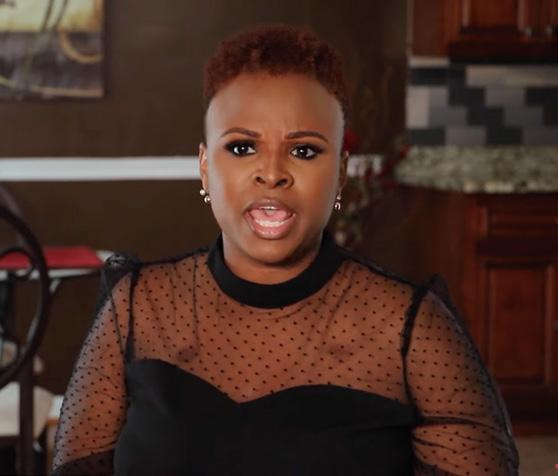
Jesse Brown
Victor Gonzalez
Nick Guercio
Kyle Haines
CONTACT US
National Headquarters Wall Street Plaza 88 Pine Street, Suite 2400 New York, NY 10005
Tel: 212 349 2910 lymphoma.org
LRF Helpline 800 500 9976 helpline@lymphoma.org
Contact the Editor
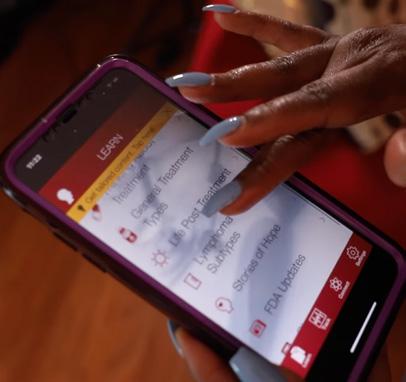 Executive Officer
Executive Officer
Meghan E. Gutierrez Chief
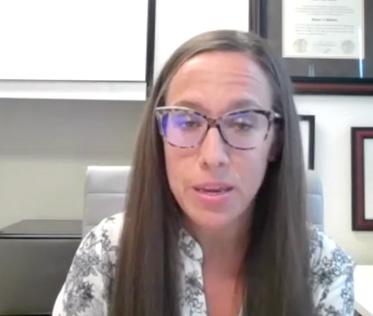
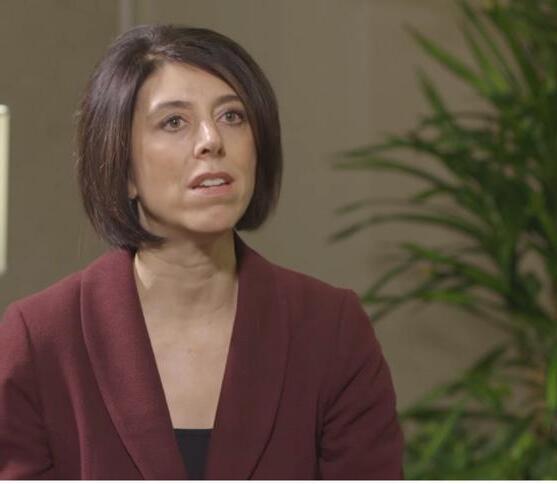
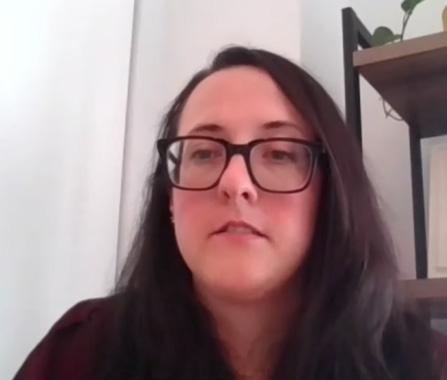
LYMPHOMA
Eva Migliore
Sarah Quinlan
Rebecca Rausch
Whitney Steen
Laura Wallenstein
For more information or to share comments, please email editor@lymphoma.org.
The Lymphoma Research Foundation’s (LRF) YouTube channel offers a wide variety of educational videos to help the lymphoma community learn about lymphoma. These videos provide disease-specific information, as well as education regarding diagnosis, treatment options, clinical trials, and other resources for people dealing with a lymphoma diagnosis. Visit YouTube.com/c/LymphomaResearch to watch and subscribe.
RESEARCH FOUNDATION’S YOUTUBE CHANNEL
PULSE | SPRING EDITION 2023
Pulse © 2023 Lymphoma Research Foundation
[ FEATURES ]
Following a Passion to Improve Patients’ Lives
Dr. Lindsay M. Morton’s path toward her pioneering career in lymphoma epidemiology had a surprising start: dolphins. Her dreams of being a marine biologist transformed into a love of the scientific process and the power of research that drives her work at the National Cancer Institute’s Cancer Survivorship Research Unit.
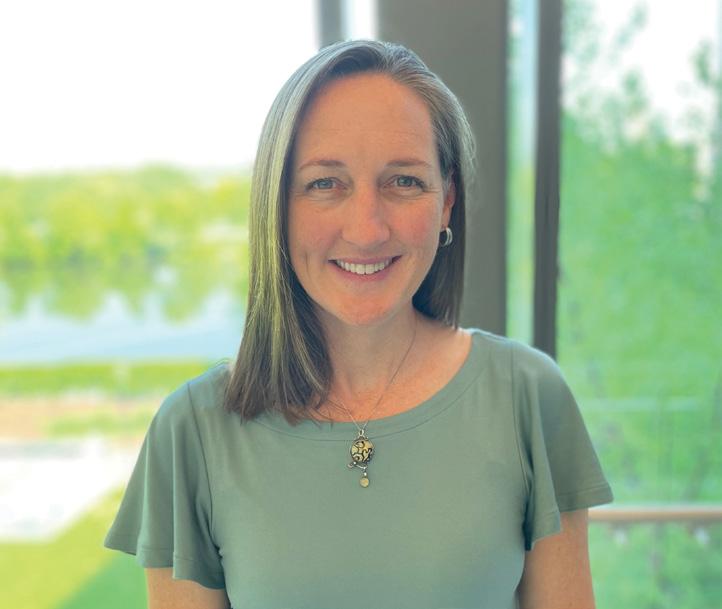
Meet the 2023 Career Development Award, Postdoctoral Fellowship, and Follicular Lymphoma Priority Research Grant Grantees
The 16 Career Development Award, Postdoctoral Fellowship, and Follicular Lymphoma Priority Research Grants include projects exploring numerous disease subtype treatments, including rare disease states, like T-cell lymphomas, as well as novel therapeutics, including chimeric antigen receptor (CAR) T-cell therapy.
Story of Hope: Scott Fink
Scott Fink is no stranger to life’s challenges. In October 2020, he never expected to face one of his biggest challenges yet – being diagnosed with lymphoma in the midst of a raging global pandemic.
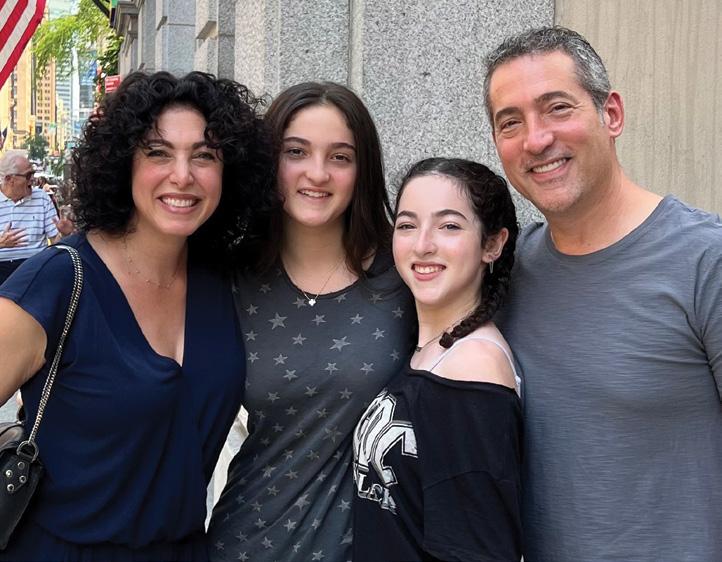
[ DEPARTMENTS ] Community Impact Philanthropy in Action Donor Spotlight FYW Awards Recap 4 From the Field Researcher Spotlight Where Are They Now? Meet the 2023 Grantees 10 Living with Lymphoma Story of Hope 28
TABLE OF CONTENTS
10
18
28 1
PATIENT EDUCATION PROGRAMS
Spring Education Programs:

6.14
Virtual Ask the Doctor: Information on Treatment Options and Clinical Trials
6.17 In-Person Chicago Lymphoma
The Lymphoma Research Foundation (LRF) hosts more than 50 free patient education programs each year to provide members of the lymphoma community with up-to-date information about lymphoma and treatment options. These patient education programs include Ask the Doctor About Lymphoma, Lymphoma Workshops, Webinars, and the
North American Educational Forum on Lymphoma, for people with lymphoma and their loved ones.
Whether you are newly diagnosed, want detailed information about your lymphoma subtype, are looking for ongoing support, or are seeking help with long-term survivorship, LRF is here to help.
Visit lymphoma.org/programs to register and learn more.
Workshop
8.1
Los Angeles Lymphoma Workshop
10.6-10.8
North American Educational Forum on Lymphoma
FROM THE CEO
Since its inception, one of the Lymphoma Research Foundation’s (LRF) guiding priorities has been pushing the field of lymphoma/chronic lymphocytic leukemia (CLL) forward toward a future free of the disease. It’s why we have funded over $76 million in lymphoma-specific research, which has led to crucial breakthroughs and cutting-edge treatments, and it is why we are committed to supporting the next generation of lymphoma researchers. You will learn more about the brightest scientific minds committed to the study of this disease as we introduce you to our 2023 Clinical Investigator Career Development Award (CDA), Postdoctoral Fellowship, and Follicular Lymphoma Priority Research Grant grantees in this issue of Pulse. This distinguished group of researchers will help advance blood cancer research and lay the groundwork for improved patient care and breakthrough therapeutic methods. We are excited to witness the ways in which the work produced by these grantees will drive a deepened understanding of lymphoma and innovation toward a cure.
This issue also highlights an atypical path toward lymphoma research in our profile of Dr. Lindsay Morton, whose passion for epidemiology began during her undergraduate years with her work on a dolphin research study. Dr. Morton’s dedication as a member of our Scientific Advisory Board has informed our research portfolio and now a new effort focused on survivorship. Lastly, this issue features a dedicated group committed to supporting the lymphoma community as we celebrate the winners and nominees of our inaugural Fundraise Your Way awards. From bake sales to bike rides, these volunteers turn their talents and interests into one-of-a-kind fundraisers that power LRF’s mission.
The work that we do to invest in the future of lymphoma research and support our community of scientists, patients, survivors, and caregivers would not be possible without the steadfast dedication of our supporters. Your staunch commitment and your belief in the Foundation’s mission moves us closer every day to a future without lymphoma.
Sincerely yours,
 Meghan Gutierrez Chief Executive Officer
Meghan Gutierrez Chief Executive Officer
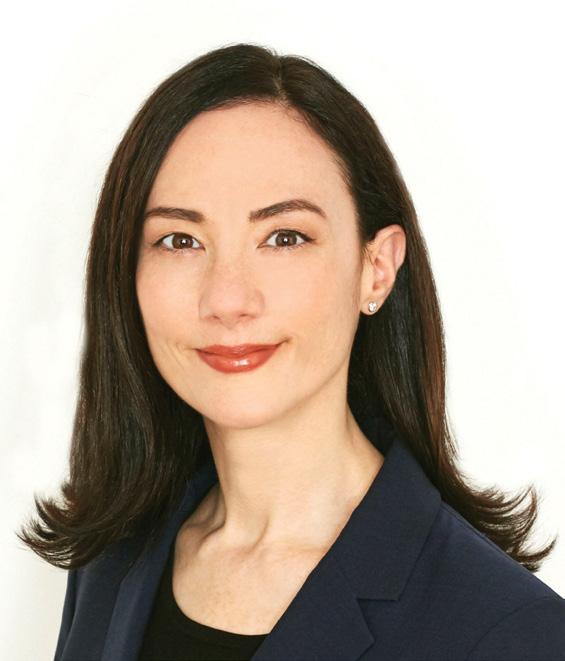
3
PHILANTHROPY IN ACTION
LOS ANGELES MARATHON RAISES
MORE
THAN $10,000
Team LRF took to the streets of Los Angeles alongside over 20,000 fellow racers for the 38th annual Los Angeles Marathon on March 19, 2023. The team of 3 dedicated runners raised $10,000 to power lymphoma research and to raise awareness for LRF’s mission as they ran 26.2 miles, starting at Dodger Stadium in downtown LA and crossing the finish line in Century City.
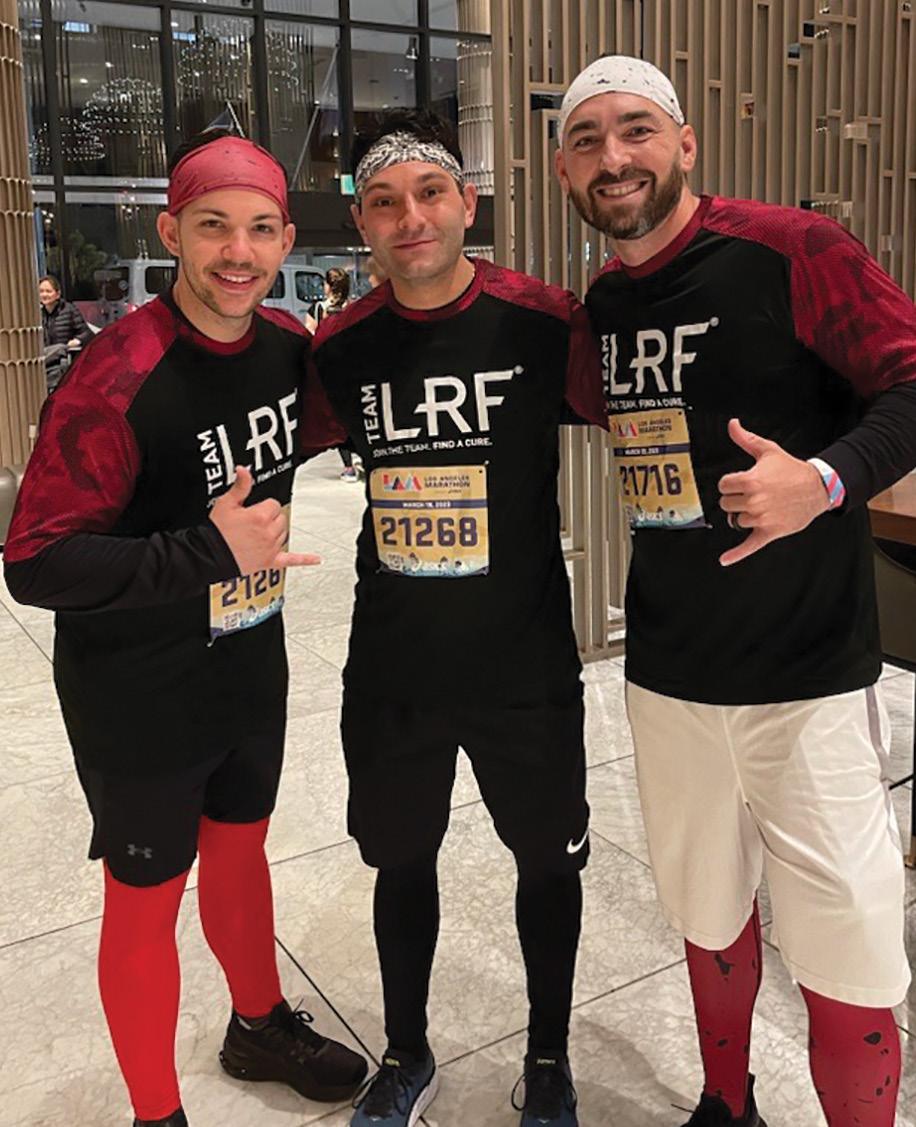
LRF DC METRO AREA GOLF OUTING RAISES MORE THAN $50,000
Over 50 LRF friends and supporters took a shot at curing blood cancer at the inaugural DC Metro Area Golf Outing on April 28. Guests enjoyed a fun day at the Links at Challedon in Mount Airy, Maryland, one of the area’s premier golf courses, and were joined by former Washington football great Mark Rypien. As the golfers hit the links, they raised over $50,000 in critical funds supporting LRF’s community of patients, survivors, researchers, and caregivers.
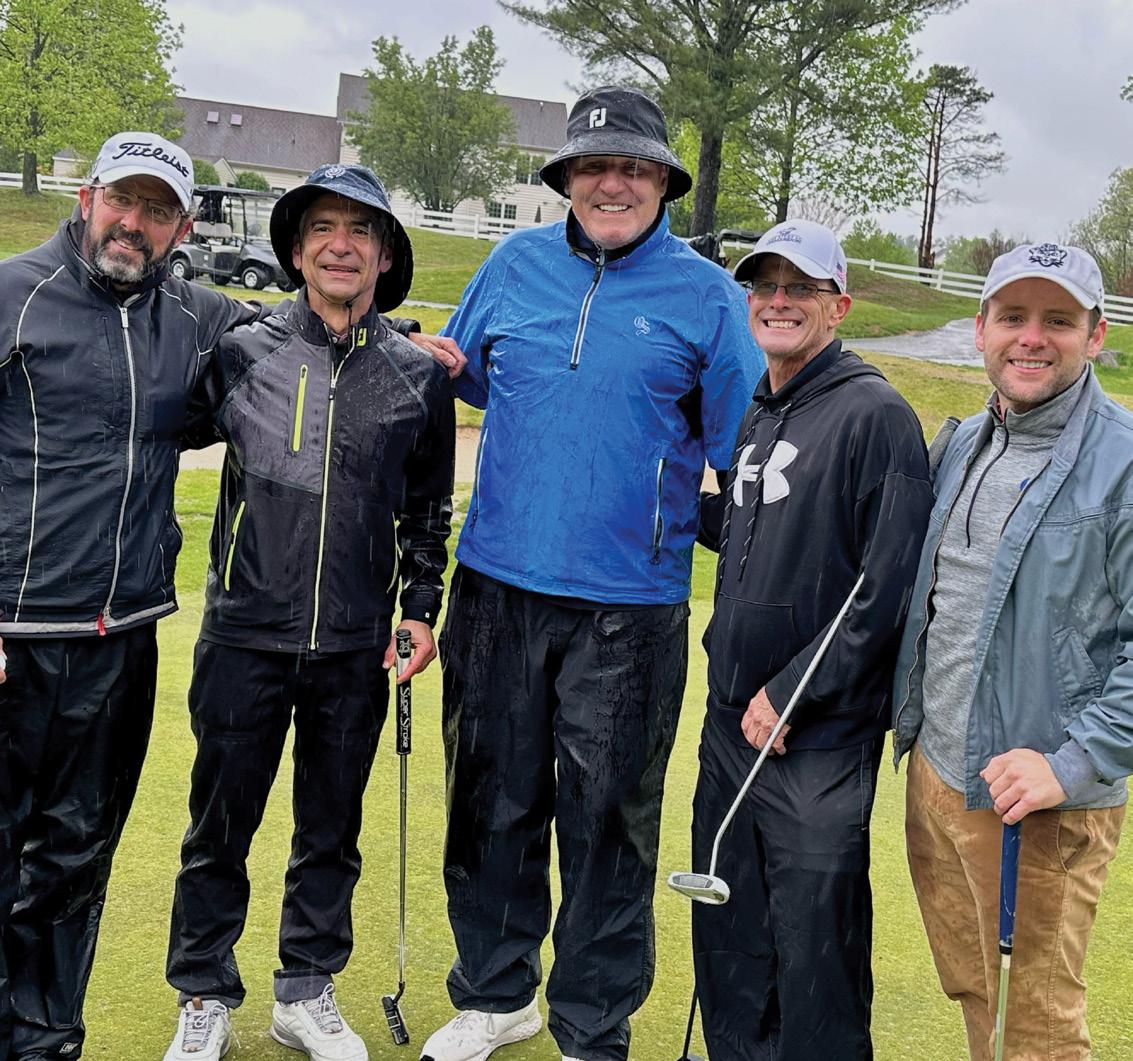
[ COMMUNITY IMPACT ] PULSE | SPRING EDITION 2023
IRISH WHISPER WALK RAISES MORE THAN $30,000

Fundraise Your Way events are one-of-a-kind fundraisers supporting the lymphoma community – and they can also become beloved yearly traditions. On April 29, 2023, the Kane family held their 14th Annual Irish Whisper Walk in memory of their father, Danny Kane, who they lost to lymphoma. This year’s event, held in West Milford, NJ, featured 150 walkers and raised over $30,000 in support of LRF’s mission to fund innovative research and serve as a resource for the patient community.
GOLF INVITATIONAL RAISES MORE THAN $300,000
LRF donors and supporters teed off at Quaker Ridge Golf Club in Scarsdale, New York, on May 23 for LRF’s 2023 Golf Invitational. Golfers tested their skills on one of the top golf courses in the country, home to three Met Opens, three Met Amateurs, three Met PGA Championships, and the 2018 USGA Curtis Cup Match. As guests enjoyed this elite golf course, they also raised $300,000 to further LRF’s mission of eradicating lymphoma. This annual event is chaired by longtime LRF supporters Steve Prince and Jim Stern.
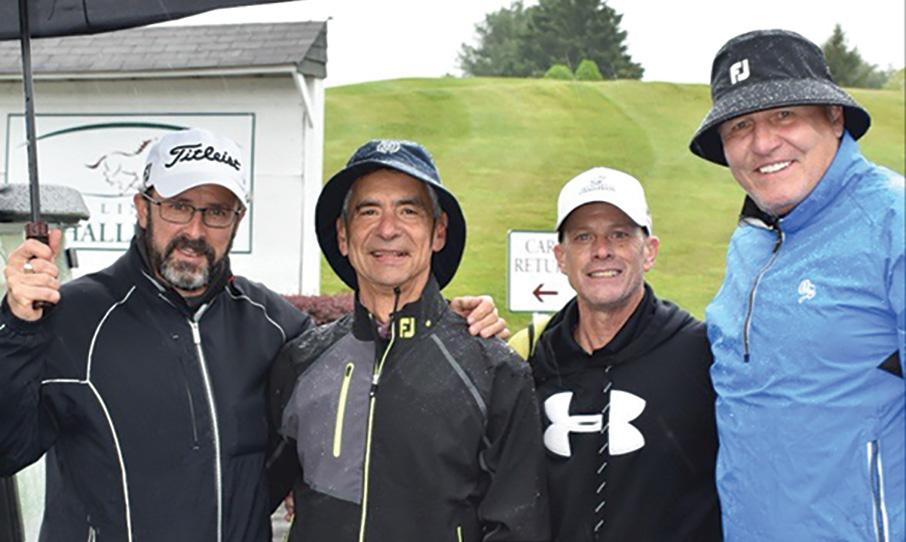
5
ADVANCING CLL/SLL RESEARCH IN THE NAME OF KANTI R. RAI, MD

Dr. Rai has been a global leader in the field of lymphoma/CLL research for more than four decades. His early and groundbreaking work in CLL research resulted in the Rai prognostic categorization of CLL, the staging system used today by physicians and clinical investigators around the world. His research led to the development of several innovative cancer therapies, transforming the way in which CLL is treated.
In 2022, the Lymphoma Research Foundation (LRF) announced the Kanti R. Rai, MD Clinical Scholar for chronic lymphocytic leukemia (CLL) in recognition of Dr. Rai’s global leadership in the field of lymphoma/ CLL research and his commitment to LRF’s mission. The Foundation set an ambitious goal of raising $750,000 to make funding for this grant permanent and enable them to award one participant of LRF’s Lymphoma Scientific Research Mentoring Program (LSRMP) with the Kanti R. Rai, MD Scholar award each year.
What started as a fundraising initiative quickly turned into a celebration of Dr. Rai by former and current patients across the country. Bruce Yablon is a CLL patient and former Vice Chair of the Finance Committee for the Northwell Heath System where Dr. Rai was the lead clinician for over 40 years. Bruce met Dr. Rai through his work on the LRF Board, and when this initiative was announced, he made the lead gift. From there, several other patients came forward to contribute and share their stories of how Dr. Rai impacted their lives. One supporter,
[ COMMUNITY IMPACT ]
PULSE | SPRING EDITION 2023
Debra Rubenstein, shared that Dr. Rai was the first oncologist she met with following her diagnosis. When seeking a second opinion, she told her other oncologist that she had seen Dr. Rai and the physician exclaimed, “Dr. Rai? You don’t need a second opinion!” Debra has been a patient of Dr. Rai for more than 20 years.






Thanks to 41 generous supporters, the $750,000 goal was met in February 2023 – with donations continuing to come in – and the inaugural Kanti R. Rai, MD Scholar award has been given to Christine Ryan, MD, from Dana-Faber Cancer Institute in Boston, MA. Dr. Ryan is a part of the 2023 class of LRF scholars, and her participation in the LSRMP will help her establish herself as an independent researcher.




“This is an incredible honor and privilege. Dr. Rai is an inspiration to all in the field of CLL, and I am excited to be conducting my research project with the support of this award,” said Dr. Ryan. “I am tremendously thankful to the generous donors who provided funding, as well as to the LRF for the invaluable opportunity to be part of the LSRMP.”
The Foundation’s LSRMP supports up to 12 early-career researchers each year. Grantees, known as LRF Scholars, receive, attend, and participate in an intensive week-long workshop in which they learn from and network with the Foundation’s renowned Scientific Advisory Board members. Over the course of the two-year program, LRF Scholars gain the skills needed to successfully design and administer clinical research studies, apply for future grant funding, and establish themselves as independent researchers. The establishment of the Rai Scholar Award ensures the next generation of CLL researchers will receive support not just from LRF, but also from experts in the lymphoma research community and a network of their own peers as they develop their careers as independent academic researchers.

“This is an incredible honor and privilege. Dr. Rai is an inspiration to all in the field of CLL, and I am excited to be conducting my research project with the support of this award,” said Dr. Ryan. “I am tremendously thankful to the generous donors who provided funding, as well as to the LRF for the invaluable opportunity to be part of the LSRMP.”
7
The Foundation would like to thank the donors whose philanthropic support made the Kanti R. Rai, MD Clinical Scholar and the LSRMP grant for Dr. Ryan possible. Gifts are still being accepted at lymphoma.org/rai.
DONOR SPOTLIGHT:
FYW AWARD
Each year, thousands of volunteers across the country turn their talents and interests into unique fundraising events through the Lymphoma Research Foundation’s (LRF) Fundraise Your Way program. From bake sales to bike rides, LRF supporters are helping the Foundation work toward improved treatments and cures for lymphoma.
On March 14, 2023, LRF staff and supporters joined together to celebrate its dedicated Fundraise Your Way volunteers during the inaugural Fundraise Your Way Awards. Volunteers were honored in categories including Rookie of the Year, Most Innovative Fundraiser, Ride Team of the Year, Walk Team of the Year, and Endurance Athlete of the Year.
Congratulations and thank you to all of our 2023 nominees and winners!
Rookie of the Year
Presented to an inaugural fundraiser who has made a significant impact in support of LRF’s mission to eradicate lymphoma and serve those touched by this disease.
WINNER:
JIM BAKER
Pia Samson Memorial Ride
NOMINEES:
CHAD SAWARD
Team Ohana Relay
STEFANIE LOMAX
Bryte Foundation Gala
Most Innovative Fundraiser
From backyard parties to ugly sweater sales, there’s a way to turn fun into fundraising. Here’s to celebrating thinking outside of the box for LRF!
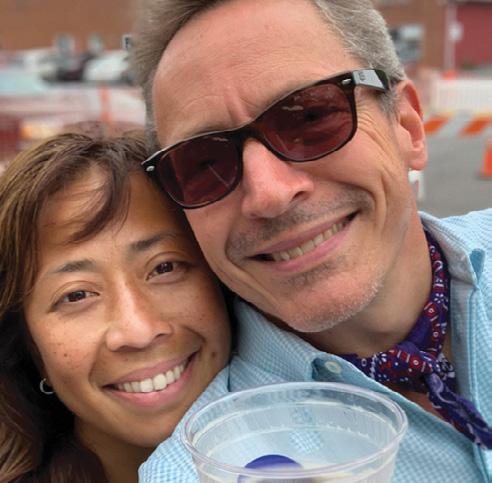
WINNER:
AMELIA BAUER
Ugly Holiday Sweater Sale
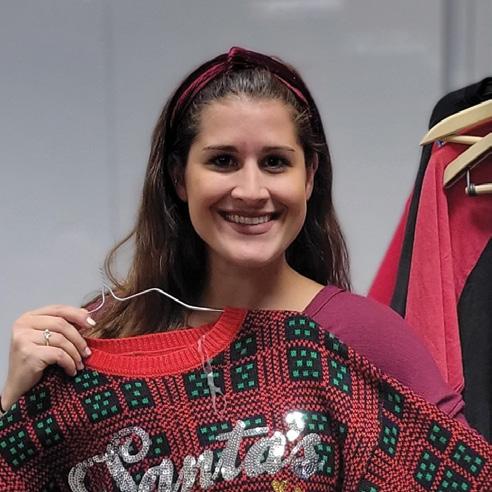
NOMINEES:
TIM CORBETT
#CorbettGremmStrong
NACY JOSEPHSON AND DEBBIE ROSCOE
Rockin’ for a Cure
[ COMMUNITY IMPACT ]
PULSE | SPRING EDITION 2023
Ride Team of the Year
Honors extraordinary fundraising efforts that support the Lymphoma Research Ride held each October. Each hill pedaled brings us closer to treatments and cures.
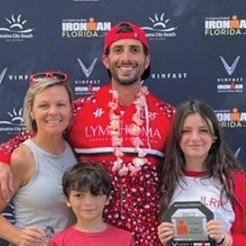
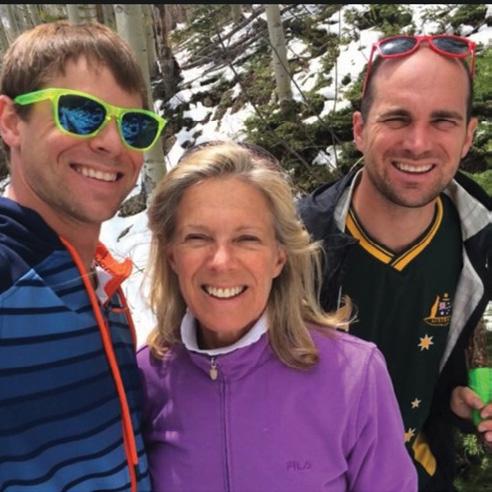
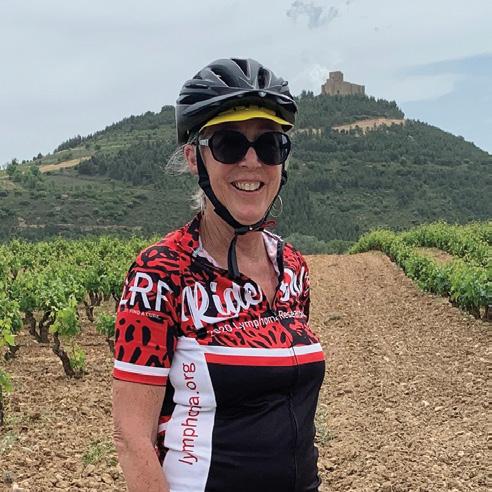
WINNER:
DIANNE CHEEK
Cheek2Cheek
NOMINEES:
HILGITA MUNOZ
Las Tortugas
DR. FRED SMITH AND BERNIE CHILDS
Lympho-Chase
Endurance Athlete of the Year
From first-time marathoners to IRONMAN champions, LRF is proud to have teams compete in endurance events worldwide, including the New York Marathon, the Twin Cities Marathon, the Los Angeles Marathon, and the IRONMAN World Championships –every mile makes a difference.
WINNER:
DAN ANDERSON
LRF Tri Team
NOMINEES:
CAMERON CARONE
Stockholm Marathon
MEREDITH JONES
New York Marathon
Fundraiser of the Year
Presented to a top fundraising event that is making the future of cancer research possible!
HONOREE:
KANE FAMILY
Irish Whisper Walk
Walk Team of the Year
Celebrates outstanding and creative fundraising for one of LRF’s Lymphoma Walks (Chicago, New York, Dallas, Minneapolis, Phoenix).
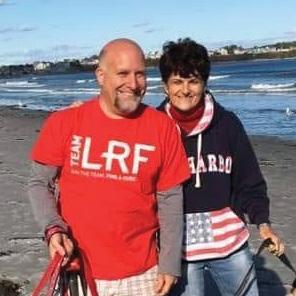
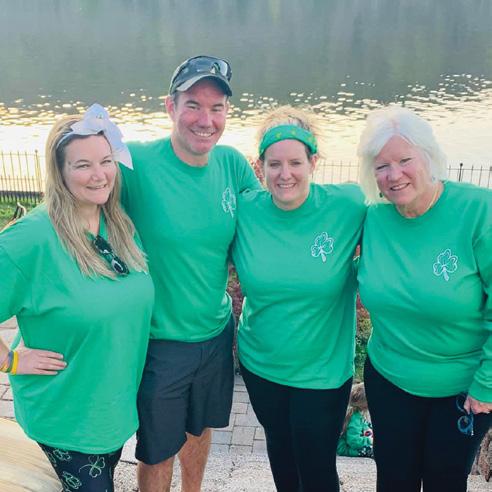
WINNER:
AIMEE LANPHERE
Hike for Mike 7.0
NOMINEES:
DEUTSCH FAMILY
The Knockouts
AED UT DALLAS
Wendy’s Eagles
Chuck Papanos Legacy Award
This special honor will be given annually to an individual who embodies Chuck’s mantra, “Doing Nothing is Not an Option.”
HONOREE:
ANN MARIE PAPANOS
Naperville Lymphoma Walk

Lifetime Achievement Award
A truly standout effort – presented to a dedicated supporter whose efforts are unparalleled – that makes hope possible!
HONOREE: TJ RAGUCCI
Northeast Rod Run
9
FOLLOWING A PASSION TO IMPROVE PATIENTS’ LIVES
Lindsay M. Morton, PhD, Director of the Radiation Epidemiology Branch and head of the Cancer Survivorship Research Unit in the Division of Cancer Epidemiology and Genetics (DCEG) at the National Cancer Institute (NCI), has dolphins to thank for her passion for epidemiology and cancer research.
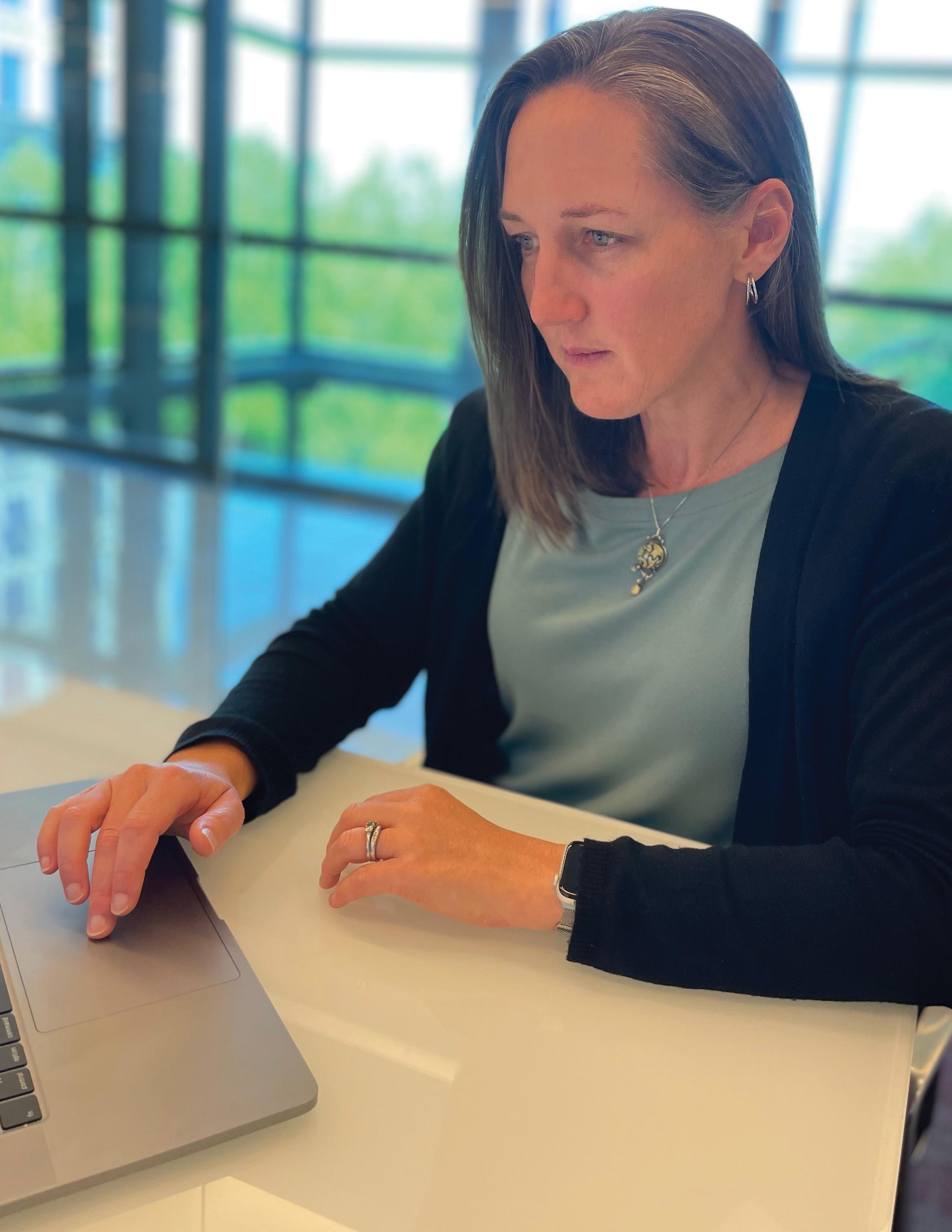
[ FROM THE FIELD ] PULSE | SPRING EDITION 2023
After growing up in the Midwest, Dr. Morton attended Dartmouth College as an undergraduate, completed her PhD in epidemiology at Yale University School of Public Health, and has called the Washington, D.C., area – and NCI – home for the past 20 years. Being a competitive swimmer and having always enjoyed spending time outdoors connected to nature, Dr. Morton originally had dreams of being a marine biologist. She was thrilled to have the opportunity to volunteer with a dolphin research study in New Zealand as a junior in college and through that experience, gained a meaningful mentor who helped lead Dr. Morton to a career in epidemiology.
“I was explaining to my biology professor, Dr. Thomas Roos, that I loved medicine, I loved math, I loved biology, and I loved research. I was a sophomore just trying to figure out what I might want to do with my life,” recalls Dr. Morton. “He asked me if I’d ever heard of epidemiology because I’d basically just defined it. I was so grateful to learn about this field early in my undergraduate days.”
“He asked me if I’d ever heard of epidemiology because I’d basically just defined it. I was so grateful to learn about this field early in my undergraduate days.”
Cancer epidemiology was of immediate interest to Dr. Morton because the disease impacts so many people’s lives, but she didn’t follow a straight path into cancer research. While applying for a Senior Fellowship to conduct research during her final year at Dartmouth under Dr. Roos’s mentorship, she felt torn between a project related to the dolphin research she’d done in New Zealand and an epidemiology project, so she sought advice from her mentor. “Much to my surprise,” said Dr. Morton, “he told me that I had an entire career to contribute to cancer epidemiology, so I should take advantage of the opportunity to go and be with the dolphins again.”
Dr. Roos emphasized that Dr. Morton would still learn everything she needed to know about the scientific process – it turned out he was right.
“My earliest research experiences really shaped the way I’ve approached some important decisions in my career and the way I mentor fellows. Fundamentally, what really matters is what people are passionate about,” says Dr. Morton. “Through my dolphin research, I learned how much I appreciate precision in measurement and how important it is to understand exactly how data are collected. It also confirmed my desire to work in epidemiology and dedicate my career to improving people’s health.”
An Epidemiologic Perspective
During her PhD program, one of Dr. Morton’s professors offered her the opportunity to research the etiology of lymphoma, which spoke to her interest in immunology as well as her love of medicine, math, biology, and research.

“The immune system’s complexity is particularly intriguing to me, which is reflected in some of my earliest research,” said Dr. Morton. “When a pathologist, clinician, or molecular biologist can identify critical differences in types of lymphoma, what are the implications for epidemiological studies? Epidemiology is at the heart of all I do, but I’ve always been drawn to interdisciplinary projects.” Epidemiologists studying lymphoma help to explain the “who, what, where, when, and why” of lymphoma occurrence, which can provide insights into the disease biology and open doors for prevention.
Dr. Morton was first excited to join NCI as a epidemiology postdoctoral fellow through its training program. She has stayed at the NCI because of the dynamic colleagues, research mission, and commitment to mentoring. “DCEG (Division of Cancer Epidemiology and Genetics) has a strong commitment to the career development of junior scientists,” says Dr. Morton. “I’ve chosen to stay in part because of the mission, but also because it’s an incredibly collaborative environment. The scientific culture here is all about working together to produce the most rigorous and impactful science we can, and DCEG encourages trainees to contribute every step of the way.”
11
Prioritizing Survivorship
Dr. Morton’s early interests in interdisciplinary lymphoma research were evident in her work with the International Lymphoma Epidemiology Consortium, known as InterLymph, one of the first large-scale epidemiologic consortia to bring together interdisciplinary collaborators from around the world. Dr. Morton’s research with InterLymph focused on understanding lymphoma etiology and included strong partnerships with pathologists. But she quickly realized that contributing to survivorship research would better speak to her passion for medicine and research with direct impact on patients.
No matter what age one is diagnosed, survivorship research prioritizes the need to follow patients over the long term to better understand how researchers and clinicians can improve patients’ health–not just at the time of diagnosis and treatment, but throughout their lives. According to Dr. Morton, the science of survivorship research is critically important and has substantially evolved in recent decades, shedding new light on both short- and long-term risks and benefits of different treatment approaches so that clinicians and patients can make more informed treatment and clinical care decisions. With improvements in early detection and survival, the number of cancer survivors in the United States has grown dramatically. To better address patients’ long-term health and capitalize on the diverse expertise in DCEG, in 2022
Dr. Morton helped to establish the Cancer Survivorship Research Unit. The goal of the unit is to encourage the exchange of ideas, develop methodologies related to cancer survivorship, and to help define the scope of survivorship research in DCEG.
“The Cancer Survivorship Research Unit enables us to bring together interdisciplinary investigators from other branches and have a rich intellectual exchange,” said Dr. Morton. “I’m fortunate to be part of a broad research community that is dedicated to helping patients live longer, healthier lives.”
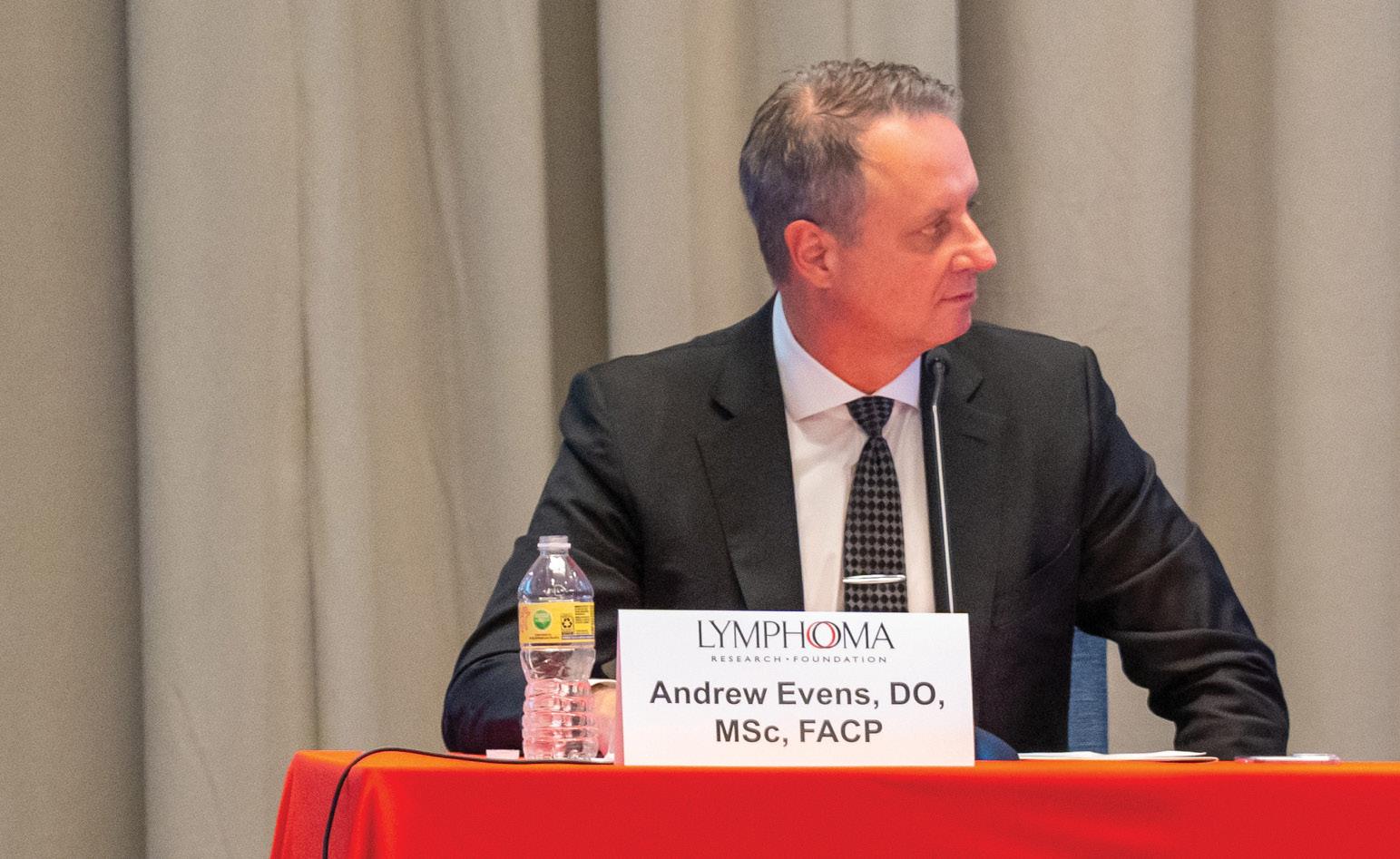
[ FROM THE FIELD ]
PULSE | SPRING EDITION 2023
“The Cancer Survivorship Research Unit enables us to bring together interdisciplinary investigators from other branches and have a rich intellectual exchange,” said Dr. Morton. “I’m fortunate to be part of a broad research community that is dedicated to helping patients live longer, healthier lives.”
Holistic Support of the Research, the Scientists, and the Patients
Over the course of her career, Dr. Morton has volunteered her time to the Lymphoma Research Foundation (LRF) in several capacities. Currently a member of LRF’s Scientific Advisory Board (SAB) as well as the Adolescent and Young Adult Lymphoma Consortium Initiative, she is consistently impressed with the wide-ranging community of patients, caregivers, clinicians, and scientists that LRF serves.
She is particularly thrilled to be able to bring her expertise and experience with cancer survivorship research to LRF, most recently helping to form and lead LRF’s SAB Survivorship Working Group. “Lymphoma survivors are incredibly diverse because of the complexity of the disease. They may be young or old, survivors of indolent or aggressive disease, in the midst of treatment or many years out – and everything in between. Our hope is that the LRF SAB Survivorship Working Group can contribute to improving all survivors’ lives.”
Initially, the group is reviewing LRF’s patient materials from a survivorship perspective and assessing the consistency of survivorship guidelines – and potential gaps in those guidelines – from various organizations. This review of clinical guidelines will help prioritize future research in lymphoma survivorship. “As an epidemiologist, I recognize the incredible power of bringing together
information from many patients to conduct research, but I never forget that each patient has their own story, and I am so grateful for their willingness to participate in the research process to help advance knowledge and ultimately improve clinical care,” said Dr. Morton.
LRF is unique in Dr. Morton’s view because it not only provides information and support to patients, but also bridges into the science and training of scientists. She recognizes a similar dedication to supporting and mentoring scientists at LRF as she does in her work at the NCI.
“The early portion of a scientist’s career is a critical time and often presents key inflection points,” said Dr. Morton. “Research funding is essential, but it’s also important to build a network of mentors and collaborators. By supporting investigators through the Early Career Grants program, LRF brings the best and brightest into lymphoma research and ensures that they launch their careers on a sure foothold.”
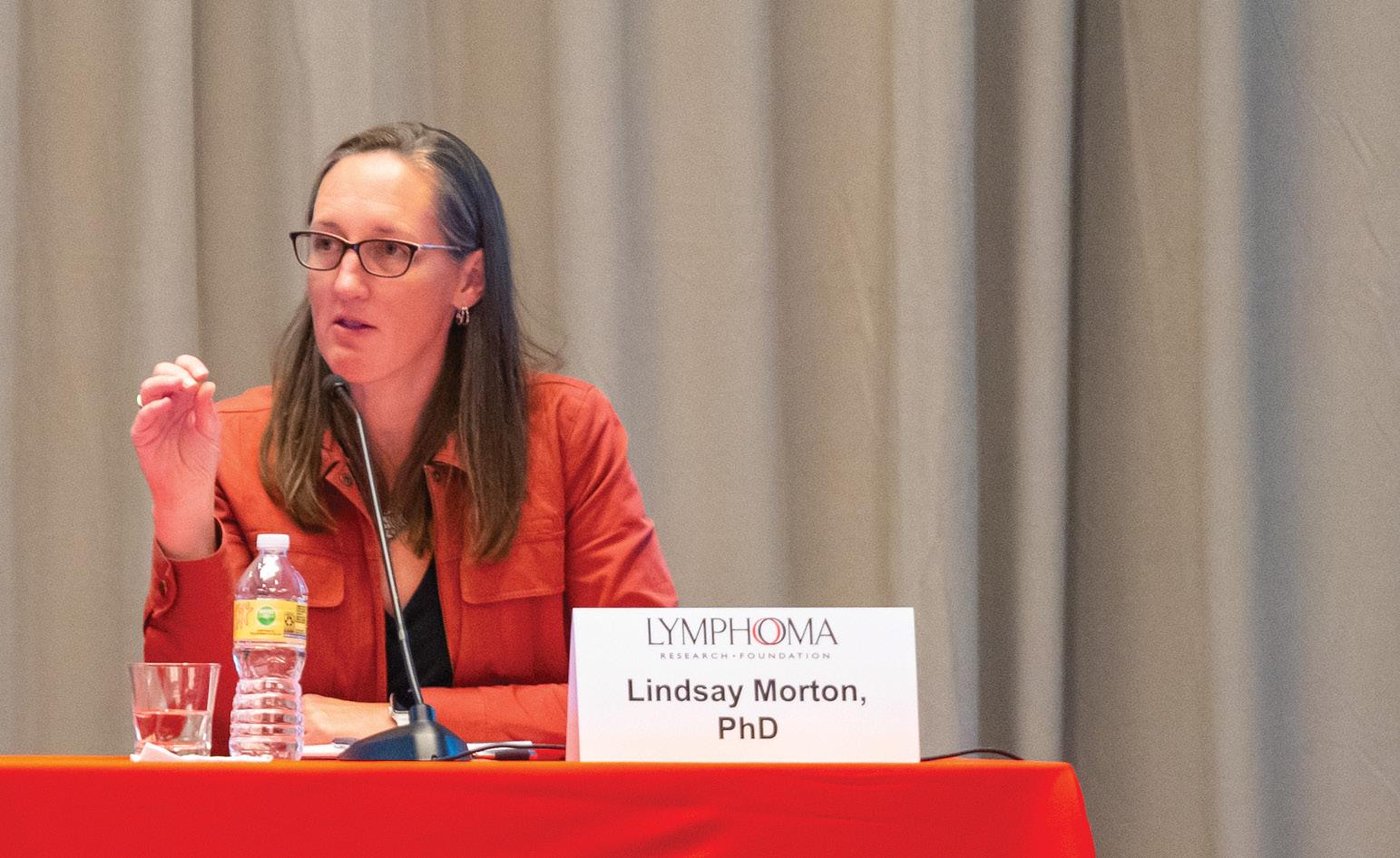
13
WHERE ARE THEY NOW?
MARTIN RIVAS, PHD

[ FROM THE FIELD ]
PULSE | SPRING EDITION 2023
Dr. Martin Rivas is an Assistant Professor at the University of Miami Miller School of Medicine.
When did you become interested in the study of biology? In oncology and lymphoma specifically?
I was attracted to nature from a very young age. I was curious about all animals, but whales were particularly fascinating to me. That curiosity led me to enroll in biology when I went to college, at the University of Buenos Aires. However, after taking courses in molecular biology my plans changed. What I thought would be a career in marine biology, rapidly became a career in biomedical sciences. I was amazed by what happens in the nucleus of the cells and I realized that I wanted to become a cancer researcher. I did a PhD studying breast cancer and then moved to New York to pursue postdoctoral training in the lab of Scientific Advisory Board (SAB) member, Ari Melnick. There, I learned about B cells and epigenetics. Normal B cells are quite unique in many aspects, already displaying many cancer cell features such as accelerated proliferation and decreased DNA damage response.
At what point in your career did you receive funding from the Lymphoma Research Foundation (LRF)? What kind of grant(s) did you receive?
I received funding from the LRF during my postdoctoral training at Weill Cornell. I was one of the 2015 LRF Postdoctoral Fellowship Grantees.
What scientific project did you pursue as part of your LRF research grant(s)?
With the LRF grant, I explored the role of cohesin during B cell development and lymphomagenesis. Cohesin is a ring-like complex that is present in all living cells and has a role in DNA folding. Our study on cohesin in B cells demonstrated that decreased levels of cohesin affect the normal development of B cells and predispose cells to malignant transformation. Mechanistically, low cohesin in B cells induced a decrease in tumor suppressor genes, making the cells more prone to malignant transformation.
How has our understanding of the development of lymphoma/CLL changed since you first started conducting your research?
We have seen major strides in lymphoma research in the last few years. In the broad field of epigenetics, several lymphoma drivers have been discovered with targeting drugs moving quickly to clinical trials. Our own research proposes a novel mechanism by which genes that are seldom mutated can be transcriptionally deregulated, causing lymphomas. In addition, lymphoma therapy has been revolutionized by immunotherapies with CAR-T cells.
How do your research goals to explain how lymphoma develops and progresses lead to new and more effective treatments?
Our exploration of fundamental aspects of B cell differentiation and lymphomagenesis is crucial to open new avenues for lymphoma treatment. B cell lymphomas – and indeed every cancer cell – undergo Darwinian selection to evade antitumor therapies resulting in more malignant and more difficult to treat cancers. Studies like ours, allow us to be one step ahead of that process to anticipate lymphoma progression and achieve better management of the disease.
Was the support and grant funding you received from LRF vital to advancing/dedicating your career to studying lymphoma?
The LRF Postdoctoral Fellowship Grant was vital to pursuing a lymphoma career. When I received an LRF grant in 2015, it was the last opportunity I had to apply for a postdoctoral fellowship. This award was a lifeline to my career. It boosted my confidence and enthusiasm for lymphoma research. I know quite well that I wouldn’t have been able to open my own laboratory if I had not been awarded the LRF fellowship during my postdoc.
How has your involvement with LRF evolved since receiving an early career grant?
I have always acknowledged the transformational effect that the LRF Grant had on my career, and I have encouraged junior members of the lab to apply for the same grant ever since. I have participated in LRF’s NYC Lymphoma Walks, and I have fundraised with our lab team for the LRF. I have also participated in an LRFsponsored patient outreach activity, a rare opportunity where I – a PhD without medical background – had the chance to discuss my research with lymphoma patients, the ultimate beneficiaries of my research. I have also participated in LRF’s Lymphoma Scientific Research Mentoring Program (LSRMP) as a faculty member. It is always a pleasure to contribute to LRF.
15
When I received an LRF grant in 2015, it was the last opportunity I had to apply for a postdoctoral fellowship. This award was a lifeline to my career. It boosted my confidence and enthusiasm for lymphoma research.
Why is LRF’s mission and focus on lymphoma-specific research and programming important? Put another way: How would the lymphoma community be impacted if there was no LRF?
The LRF occupies a unique niche that distinguishes it from all other foundations that fund hematologic malignancies research. This is very important because funds are committed specifically to lymphoma research and are not diverted to fund other cancer types. For the research community, the LRF provides a common forum that nucleates scientists, doctors, fundraisers, and lymphoma patients to work for a common cause.
You recently opened your own laboratory at the Sylvester Comprehensive Cancer Center. What research or projects are you currently pursuing that you would like to share with our readers, and what does running your own lab mean to you?
My research program at the Sylvester Comprehensive Cancer Center stems from my postdoctoral work with Ari Melnick at Weill Cornell. My projects will continue to explore the role of cohesin and its regulatory partners in B-cell development and B-cell lymphomas. Being the lab head is the realization of a long-term project that started in my home country, Argentina, and for which I have worked tirelessly. It is also a joint effort from friends, family, funding agencies – including the LRF – and mentors for which I am always thankful. It is an exciting opportunity for personal and professional growth but also a high responsibility: Our work has the potential to change the world in which we live. And ultimately, it is a unique opportunity to learn something new that can improve lymphoma patients’ lives.
What are you most excited about in the field of lymphoma research today? Why?
I think we are living in a unique time for advancing lymphoma research. The amazing development of sequencing techniques in the last few decades and the integration of different data types allows us now more than ever to characterize in more detail lymphomas that were seen before as a single entity. We are getting closer and closer to the promise of personalized lymphoma treatment: the knowledge that will allow us to treat every patient with the right drug. The definition of novel molecular subtypes of lymphoma is a game changer for clinical trials and the lymphoma clinics themselves. I can only imagine the big developments in the years to come!
[ FROM THE FIELD ]
PULSE | SPRING EDITION 2023
The LRF occupies a unique niche that distinguishes it from all other foundations that fund hematologic malignancies research. This is very important because funds are committed specifically to lymphoma research and are not diverted to fund other cancer types.
LATEST U.S. FOOD AND DRUG ADMINISTRATION (FDA) APPROVALS
The U.S. FDA is is responsible for the approval of drugs, including biological products, for human use in the United States.
January 19, 2023 – zanubrutinib for chronic lymphocytic leukemia/small lymphocytic lymphoma (CLL/SLL).
January 27, 2023 – pirtobrutinib for relapsed or refractory mantle cell lymphoma (MCL) after at least two lines of systemic therapy, including a BTK inhibitor.
17
MEET THE 2023 CAREER DEVELOPMENT AWARD, POSTDOCTORAL FELLOWSHIP, AND FOLLICULAR LYMPHOMA PRIORITY RESEARCH GRANTEES






































In April, the Lymphoma Research Foundation (LRF) announced its 2023 grant class — 27 research grants awarded to scientists based at many of the world’s leading cancer research institutions — totaling more than $5.4 million in innovative lymphoma and chronic lymphocytic leukemia (CLL) research.



LRF maintains a strong commitment to supporting early career investigators, ensuring they can build a successful career in the field of lymphoma research. This commitment is illustrated by the 16 grants awarded to early career investigators this year. They include four dynamic Clinical Investigator Career Development Awards (CDA), which support physician investigators at the level of advanced fellow or junior faculty member who will contribute to the development of new lymphoma therapies
and diagnostic tools. Also included are seven Postdoctoral Fellowship Grants, designed to support investigators at the level of advanced fellow or postdoctoral researcher in laboratory or clinic-based research with results and conclusions that must be relevant to the treatment, diagnosis, or prevention of lymphoma.


Also this year, LRF funded five Follicular Lymphoma Priority Research grants as part of the Jamie Peykoff Follicular Lymphoma Initiative. Established in 2020 through the generosity of the Peykoff Family and Niagara Cares, the $10 million Initiative is poised to transform the follicular lymphoma (FL) treatment landscape for tens of thousands of patients by harnessing the Foundation’s unique resources, convening the world’s experts in FL research and patient care, and driving direct investment in clinical research.

[ FROM THE FIELD ]
PULSE | SPRING EDITION 2023
Clinical Career Development Award (CDA)
RONI SHOUVAL, MD, PHD MEMORIAL SLOAN KETTERING CANCER CENTER
Chimeric antigen receptor (CAR) T-cell therapies have been a transformative advancement in the treatment of large B-cell lymphomas. However, many patients still experience relapse after CAR T-cell therapy. Using a combination of clinical, molecular, and imaging information, Dr. Shouval’s research aims to uncover the underlying causes of relapse or progression after CAR T-cell therapies in patients with lymphoma and develop algorithms that can help predict responses to treatment. “Our findings will help us identify targets for future treatments and enhance the design of new CAR T strategies,” he says.
After completing his medical degree and training at the Technion-Israel Institute of Technology in Haifa, Israel, Dr. Shouval went on to earn a PhD in machine learning from Bar-Ilan University in Ramat Gan, Israel. He completed fellowships at the Sheba Medical Center in Israel and at Memorial Sloan Kettering Cancer Center (MSKCC) in New York, NY, and he is now a physician scientist at MSKCC focused on cellular therapy research. “Lymphoma research has always been a field of great interest to me due to the impact it has on the lives of so many people and the fascinating disease biology,” he says. “The integration of various forms of data and innovative machine learning approaches to gain a more in-depth understanding of disease recurrence and inform the design of better treatments is a truly exciting prospect.”
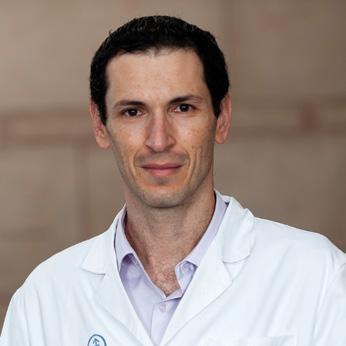
Dr. Shouval hopes to leverage the support of the LRF Career Development Award to support his transition to an independent research role. He plans to focus his research on using computational techniques to drive the development of new and innovate therapies for patients with lymphoma. “My goal is to maintain a strong connection to patient care, bringing the latest advancements in research directly to those who stand to benefit from them,” he says.
XIAOLONG (ALAN) ZHOU, MD
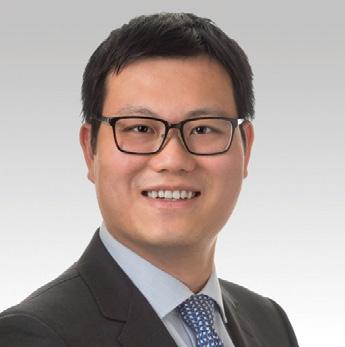
NORTHWESTERN UNIVERSITY FEINBERG SCHOOL OF MEDICINE
The abscopal effect refers to the infrequent ability of radiation therapy (RT) to stimulate antitumor immune responses that result in the shrinkage of tumors outside of RT-targeted sites. Antitumor immune effects can also be stimulated using a topical cream (imiquimod), which is sometimes used off-label in early-stage cutaneous T-cell lymphoma (CTCL). In Dr. Zhou’s LRF research project, these two potential immune-stimulating therapies – RT and imiquimod – will be combined to evaluate the ability to provide improved antitumor responses that improve disease control in a group of patients with CTCL. “Additionally, we will investigate the skin, nasal, and gut microbiomes and skin and blood biomarkers associated with clinical response or toxicity to better understand how to further maximize RT’s antitumor effects,” he adds.
Dr. Zhou first became interested in cancer research as a high school student, where he had the opportunity study mechanisms involved in lymphoma cell death. Since then, he has earned his medical degree from Duke University School of Medicine in Durham, NC, and completed a postdoctoral fellowship in cutaneous oncology and developmental therapeutics at the Northwestern University Feinberg School of Medicine in Chicago, IL. He is currently an Assistant Professor of Dermatology at Northwestern University, where his research team is working to develop effective, long-lasting treatment for CTCL. “My goal is to use skin lymphomas as a model system to better understand cancer-immune-microbiome interactions and to develop more effective treatments for lymphoma patients in general,” he explains.
As he looks forward to the future, Dr. Zhou is hopeful that recent advances in lymphoma research will allow for more personalized approaches to treatment and prevention. “The explosion of novel technologies to investigate the genetics, immune microenvironment, and microbiome of lymphomas gives us an opportunity to not only better understand pathophysiology, but also to develop personalized therapies,” he says.
19
“My goal is to maintain a strong connection to patient care, bringing the latest advancements in research directly to those who stand to benefit from them.”
ELISE CHONG, MD

UNIVERSITY OF PENNSYLVANIA, PERELMAN SCHOOL OF MEDICINE HEALTH EQUITY INITIATIVE
Chimeric antigen receptor (CAR) T-cell therapy has become a life-saving treatment option for many people with large B-cell lymphoma. Some patients do not respond to treatment, though, and others have shortlived responses to CAR T-cell therapy. In these cases, the prognosis is typically poor. With the support of the LRF Career Development Award, Dr. Chong is investigating how the addition of a bispecific antibody known as mosunetuzumab after CAR T-cell therapy can improve responses and prevent progression in patients with large B-cell lymphoma. “[We] hope that this nonchemotherapeutic immunotherapy approach to treating lymphoma will result in more cures for large B-cell lymphomas,” she says.
Dr. Chong’s interest in lymphoma research began when her mother was diagnosed with non-Hodgkin lymphoma when she was a teenager. “When I was an undergraduate at Princeton University, she initially nudged me to spend a summer with her oncology team,” she says. “One summer evolved into multiple summers as a research assistant and eventually full-time clinical research after college as I discovered a passion for this field.” Dr. Chong is now an assistant professor of medicine at the Perelman School of Medicine at the University of Pennsylvania, where she first earned her medical degree. She is motivated not only by her mother’s battle with lymphoma, but also by the patients she sees every day in the clinic. “Through these patients, I also see firsthand the instances in which we are reaching the current limits of our medical treatment,” she adds. “This fuels my commitment to push research forward.”
With the support of the LRF Career Development Award, Dr. Chong hopes to dedicate herself and her time to clinical research. She hopes that her work will lead to the development of safer, more effective non-chemotherapeutic approaches for the treatment of B-cell lymphomas that integrate advancements in immunotherapy and personalized medicine. “I am optimistic for the future of lymphoma due to the rapid pace at which research is advancing,” she says. “These improvements in [our] understanding of lymphoma and chronic lymphocytic leukemia have been the catalysts for both drug development and more personalized, nonchemotherapeutic approaches.”
Dr. Chong also received a Postdoctoral Fellowship Grant in 2019 and is the second person, and first woman, to receive both a Career Development Award and a Fellowship from LRF.
PATRIZIA MONDELLO, MD, PHD MAYO CLINIC, ROCHESTER
In most cases, follicular lymphoma (FL) is a slow-growing cancer associated with favorable outcomes. Some patients experience a more aggressive disease course, though, characterized by early relapse and poor outcomes. Crosstalk between healthy immune cells and malignant B cells may have important implications in the clinical course of FL, but these interactions are poorly understood. Dr. Mondello’s research, therefore, aims to understand how tumor cells evade the immune system and identify immune cells that can support disease control in unfavorable subsets of FL. “This work will fill an unmet need to understand the interactions between tumor and immune cells and identify novel therapeutic vulnerabilities,” she says.
Dr. Mondello earned her medical degree from the University of Messina in Italy and her PhD through Memorial Sloan Kettering Cancer Center (MSKCC) in New York. She has completed medical and research fellowships at University of Messina, MSKCC, and Weill Cornell Medicine in New York, NY, and is currently an advanced fellow at the Mayo Clinic in Rochester, MN. She hopes to leverage her clinical and research experiences to support a career as an independent investigator and clinician studying medical oncology, with a focus on understanding the molecular processes that regulate immune responses and hematologic cancers. “I believe that further understanding of aberrant epigenetic programming will lead to the identification of more powerful and less toxic targeted treatments for patients with lymphoma,” she says.
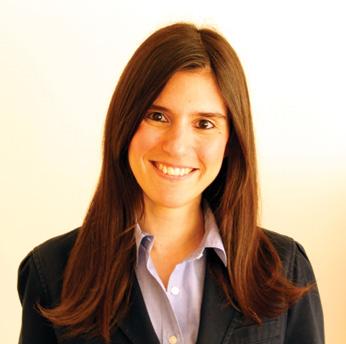
Dr. Mondello’s passion for lymphoma research comes from her experiences with a young patient early in her career. Her patient was diagnosed with an aggressive form of lymphoma that did not respond well to any available treatments. “While I enjoy caring for patients with cancer, I am often frustrated with cases like [hers] where patients would fail multiple lines of therapy, and I had nothing more to offer them,” she explains. With the support of the LRF Career Development Award, Dr. Mondello will continue working toward her goal of understanding key mechanisms in lymphoma biology that can be exploited by novel therapeutics. “I have always desired to get the best training in the field of oncology with the hope to make a major impact in the lives of my patients.”
Dr. Mondello is also a 2021 LRF Scholar through the Lymphoma Scientific Research Mentoring Program.
[ FROM THE FIELD ]
PULSE | SPRING EDITION 2023
Postdoctoral Fellowship Grant
TAYLA HEAVICAN-FORAL, PHD
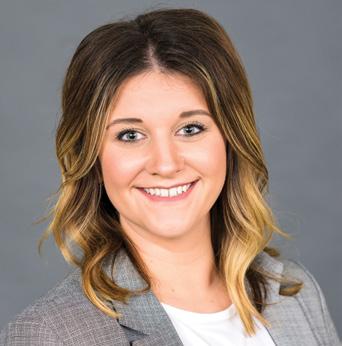
DANA-FARBER CANCER INSTITUTE
DR. OLIVER PRESS MEMORIAL FELLOW
HEALTH EQUITY INITIATIVE
Despite treatment advances in the lymphoma space, many patients with T-cell lymphomas (TCL) still experience limited response rates, often lasting for short durations, with currently available therapies. Emerging evidence suggests that a combination approach using chimeric antigen receptor (CAR) T-cell therapies with BH3 mimetics – a class of drugs that promote cancer cell death – may possess synergistic anti-cancer effects in TCL. Dr. Heavican-Foral’s research is focused on understanding these combinatorial effects, including understanding mechanisms of drug resistance and identification of markers to predict treatment responses. “These results could be used to nominate future combination strategies and guide patient monitoring to improve clinical outcomes,” she says.
Dr. Heavican-Foral’s career in lymphoma research began during her time as an undergraduate student at the University of Nebraska in Omaha, NE. After earning her PhD from the University of Nebraska Medical Center, she began her postdoctoral training at the Dana-Farber Cancer Institute and Harvard Medical School in Boston, MA. She was selected as an LRF Lymphoma Scientific Research Mentoring Program Scholar in 2022, which has helped build her passion for and expertise in lymphoma research. “As a Scholar on the translational track, this program has provided me with opportunities to receive critical feedback on my research projects and proposals, access to exceptional mentorship from lymphoma experts, and uniquely organized in-person events promoting career development,” she says.
Leveraging her research and training experiences, Dr. Heavican-Foral hopes to one day lead her own laboratory performing translational lymphoma research, with a focus on the identification and exploitation of novel therapeutic targets. “I have a hunger for discovery, and the many unknowns that still exist in our understanding of [TCL] biology and pathogenesis motivate me to continue pursuing the answers through innovative research efforts,” she says.
SANKET SHAH, PHD
WEILL MEDICAL COLLEGE OF CORNELL UNIVERSITY
DR. BRUCE D. CHESON FELLOW
Diffuse large B-cell lymphomas (DLBCL) are a heterogeneous group of lymphomas associated with poor outcomes and high rates of mortality. Mutations in genes that encode proteins responsible for regulation of gene expression, known as epigenetic regulators, are common in these types of lymphomas. One such protein is SETD2, the mutation of which leads to tumor formation in DLBCL. Dr. Shah’s research aims to understand if and how SETD2 inhibitors can be used in DLBCL.
Importantly, these types of mutations are most common in people of African ancestry. “We believe that SETD2 inhibition will induce genomic catastrophe, and [this] work may yield the first ever health-disparities precision therapy for cancer and address a critical unmet need in the lymphoma field,” he says.
Dr. Shah earned his PhD from Tata Cancer Hospital in Mumbai, India. He is currently serving as a postdoctoral fellow at Weill Cornell Medicine in New York, NY, where he is able to combine his research interests in epigenetics, oncology, and immunology. He hopes to use these experiences to jump-start a career studying the immunoepigenetics of DLBCL and the potential to leverage this information for treatment. “Lymphomas are clinically heterogenous tumors,” he says. “However, considering the enrichment in the mutation spectrum of epigenetic regulators, precision epigenetic therapy gives me hope for the future.”
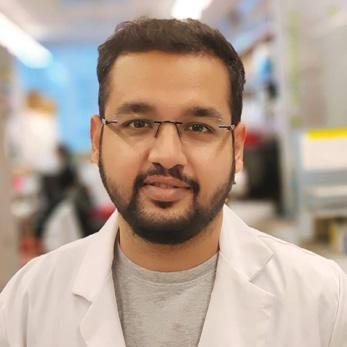
21
“Through these patients, I also see firsthand the instances in which we are reaching the current limits of our medical treatment,” she adds. “This fuels my commitment to push research forward.”
ANOUCHKA LAURENT, PHD
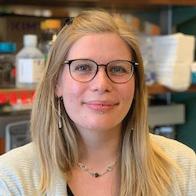
COLUMBIA UNIVERSITY IN THE CITY OF NEW YORK
Understanding the mechanisms and molecules involved in the formation of T-cell lymphomas (TCL) can illuminate new potential targets for drug development. Dr. Laurent’s research is focused on identifying genetic alternations in lymphoma and understanding how these changes lead to transformation of healthy lymphoma cells into cancer cells. Through her work, she has identified ID2 – a protein involved in regulating cellular processes related to growth and differentiation – as a potential target in TCL. “Our goal is to identify the mechanisms leading to ID2 overexpression, understand its role in T lymphomagenesis, and evaluate its potential as a therapeutic target for the treatment of [TCL],” she says.
Dr. Laurent completed her doctoral research at the Gustave Roussy Institute and the Paris Diderot University – Paris VII in France. She is currently a postdoctoral researcher at Columbia University in New York, NY, in the Institute for Cancer Genetics. Using multidisciplinary approaches, from single-cell analyses to studies in mouse models of lymphoma, her research focuses on studying the mechanisms that lead to malignant transformation, with a particular emphasis on peripheral TCL.
In the future, Dr. Laurent hopes to build on her experiences as an LRF Fellow to establish herself as an active researcher in the field of TCL. She is excited about the future of TCL research and the opportunities it illuminates to help people with these cancers. “Lymphoma research is a very dynamic field that [is becoming] more complex and challenging every day,” she says. “The perseverance of researchers to studying the mechanisms involved in lymphoma development and to enhancing tools to study them allows us to better understand these pathologies and develop more relevant and targeted therapies.”
YIFEI LIAO, PHD BRIGHAM AND WOMEN’S HOSPITAL
Several types of lymphomas have been associated with Epstein-Barr virus (EBV) infection. Little is known about how EBV manipulates cellular processes in lymphoma, though, including how it evades detection by the immune system. Dr. Liao’s LRF research project therefore aims to investigate the mechanisms that drive EBV-associated lymphomas within the cell and the germinal center microenvironment, where lymphoid cells proliferate and develop. “Current therapeutic approaches for Burkitt and Hodgkin lymphoma use high-intensity chemotherapies that do not harness the presence of viral antigens and, consequently, have significant toxicity and risk of secondary malignancies,” he says. Dr. Liao hopes that an improved understanding of how EBV contributes to lymphoma development will offer an opportunity for more targeted treatment in these types of cancers.
Dr. Liao began his research in viral oncology during his graduate studies at Texas A&M University in College Station, TX, where he studied the role of other herpesviruses in T-cell lymphomas in poultry. After earning his PhD, he started his postdoctoral research at Brigham and Women’s Hospital of Harvard Medical School in Boston, MA, where he studies EBV latency and reactivation in lymphoid cells.
Looking ahead to the future, Dr. Liao is excited to continue his research career studying the role of herpesviruses in lymphoma. In addition to understanding the basic mechanisms of how these viruses contribute to disease, he hopes to pursue translational research that supports the development of novel therapies for patients with these lymphomas.
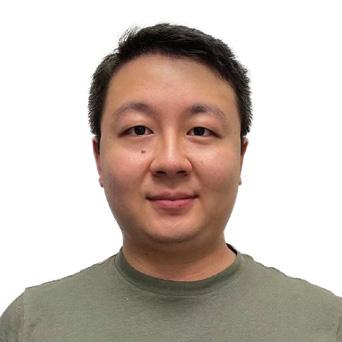
[ FROM THE FIELD ]
PULSE | SPRING EDITION 2023
“I was drawn to lymphoma research because it represents the forefront of translating scientific knowledge into actionable therapies for patients.”
CHRISTOPHER SAUTER, MD

PERELMAN SCHOOL OF MEDICINE, UNIVERSITY OF PENNSYLVANIA
Chimeric antigen receptor (CAR) T-cell therapies work by harnessing the power of T cells to kill lymphoma cells through a variety of cytotoxic mechanisms that are coordinated simultaneously. Although these therapies have revolutionized the treatment of chemotherapy-resistant B-cell lymphomas, many patients treated with CAR T cells will eventually relapse as their cancer becomes resistant to the antitumor activities of these agents. In order to prevent CAR T-cell resistance, Dr. Sauter’s research is aimed at quantifying how much each of the different cytotoxic activities contributes to antitumor activity.
“This understanding will unveil how resistant tumors may evade T-cell killing by dampening one or multiple discrete CAR T-cell pathways,” he explains. “We can leverage this knowledge to engineer CAR T cells with more potent cytotoxic potential to efficiently clear resistant tumor cells.”
Dr. Sauter earned his medical degree from Emory University in Atlanta, GA. He is currently completing a hematology and oncology fellowship at the Hospital of the University of Pennsylvania, with the goal of developing a career as a physician scientist. “I was drawn to lymphoma research because it represents the forefront of translating scientific knowledge into actionable therapies for patients,” he says. He is excited about the rapid pace of research in the field of lymphoma therapy and how it has changed the treatment of patients. “The goal post has shifted beyond achieving better ‘median overall survival’ and is now selecting which therapy will achieve the best cure, best quality of life, and minimize time spent in the hospital or physician’s office.”
Building on his experiences as an LRF Postdoctoral Fellow, Dr. Sauter hopes to create a new framework for understanding how immunotherapies work, with the goal of fueling the development of a next generation of safer and more effective options. “I am a believer in the synergy derived from the bench-to-bedside and bedside-back-tobench research cycle,” he says. “As a physician scientist, the resonance between the clinical and research realms allows for more innovative and meaningful investigation.”
AJLAN AL ZAKI, MD, PHD
UNIVERSITY OF TEXAS MD
ANDERSON CANCER CENTER
Chimeric antigen receptor (CAR) T-cell therapies represent a meaningful treatment option for lymphoma, but many patients who receive these therapies will experience side effects caused by inflammation. In some cases, macrophage immune cells activated by CAR T cells in the blood can migrate into the brain and cause neuroinflammation. Using novel imaging approaches, Dr. Al Zaki’s research aims to understand CAR T-cell-induced inflammation in the brain and how these effects can be inhibited in a mouse model. “Our hope is that this might help provide a deeper understanding to the mechanisms of toxicity and help identify new strategies for prevention or treatment, enabling more widespread adoption of current and emerging cellular-based therapies,” he says.
Dr. Al Zaki earned his PhD from the University of Pennsylvania and his medical degree from George Washington School of Medicine and Health Sciences in Washington, DC. He is currently a hematology and oncology fellow at the University of Texas MD Anderson Cancer Center in Houston, TX. Dr. Al Zaki’s passion for understanding the neurotoxic effects of CAR T-cell therapies stems from personal experience, having had a close friend who was hospitalized with side effects from CAR T-cell therapy. “She shared with me how painful and frightening this experience was to her and her family,” he says. Dr. Al Zaki hopes to leverage his background in molecular imaging to help physicians and patients better understand these effects, in turn enabling more safe and effective use of these agents.
Looking ahead to the future, Dr. Al Zaki hopes to one day be managing his own laboratory as an independent physician scientist caring for patients with lymphoma and training future oncology researchers. He is excited about the future of immunotherapies, such as CAR T cells and antibody-based therapies, and expects them to continue changing the landscape of lymphoma treatment. While he acknowledges that there is more work to do in the relapsed and refractory setting, Dr. Al Zaki sees this as an opportunity. “The silver lining is that we can continue to learn from this and build upon our knowledge to develop therapies that are more efficacious and less toxic, bringing us one step closer to finding cures,” he says.
Dr. Al Zaki is also a 2023 LRF Scholar through the Lymphoma Scientific Research Mentoring Program for this research project.
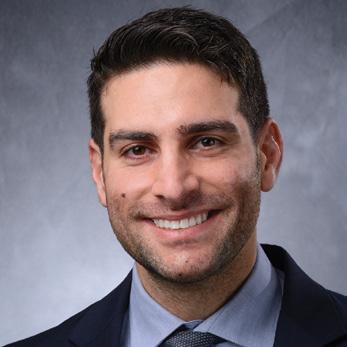
23
EDWARD DOMINGUEZ, PHD
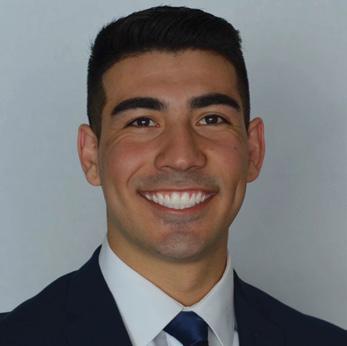
BECKMAN RESEARCH INSTITUTE OF CITY OF HOPE
HEALTH EQUITY INITIATIVE
Cyclin-dependent kinases, including CDK9, are responsible for regulation of a variety of cellular processes that contribute to the growth and expansion of cancer cells. Using small-molecule inhibitors of CDK9, Dr. Dominguez’s LRF research project aims to understand how these molecules contribute to cancer development and progression in lymphomas. His research focuses primarily on the use of these agents in aggressive subtypes of non-Hodgkin’s lymphoma, and he one day hopes that his research will provide insights into novel uses of CDK9 inhibitors in the clinic.
Dr. Dominguez earned his PhD at the University of California, Riverside, studying environmental toxicology. He transitioned to lymphoma research during his postdoctoral fellowship, which he is currently completing at City of Hope in Duarte, CA. “Although lymphoma research is new to me, cancer research is something I am very passionate about,” he says. “I have had several family members and friends suffer from cancer, and I have always cherished the idea of helping work toward one day finding a cure.” Dr. Dominguez hopes to leverage his doctoral and postdoctoral skills to build a career studying drug development in oncology and is currently focused on understanding mechanisms of drug resistance in lymphoma.
As Dr. Dominguez looks forward to his future as a lymphoma researcher, he acknowledges the challenges he has overcome as a first-generation Latino in the STEM field. “Coming from a low-income minority background, a career in science always seemed out of grasp,” he says. He notes that his early research experiences helped build his self-confidence and ignite his passion for a research career in drug discovery, and he looks forward to using his skills to develop new treatment options for lymphoma patients.
Jamie Peykoff Follicular Lymphoma Priority Research Grants
JOSHUA BRODY, MD ICAHN SCHOOL OF MEDICINE AT MOUNT SINAI
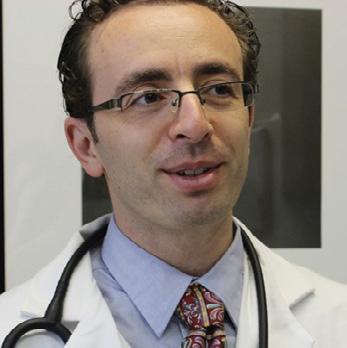
Immunotherapies, such as chimeric antigen receptor (CAR) T-cell therapies and bispecific antibodies, have revolutionized the treatment of follicular lymphoma (FL), but many patients still relapse. Antigen escape is a common cause of relapse in FL, which refers to the loss of expression of the molecular target (antigen) on the surface of tumor cells. Antigen-negative cells are often already present even before therapy begins; Dr. Brody’s research is focused on characterizing these cells to identify features that can be targeted in combination therapy regimens, which he believes will help prevent patients from relapsing.
Dr. Brody earned his medical degree from the State University of New York at Stony Brook and completed his fellowship training at the Stanford University Medical Center in California. He is currently an Associate Professor at the Icahn School of Medicine at Mount Sinai in New York, where he serves as the Director of the Lymphoma Immunotherapy Program. His interest in cancer research began early in life. “My father was a cancer immunotherapy physician-scientist long before immunotherapy was ‘cool’,” he says. “When we could not get a babysitter, he would take me to the lab and show me cancer cells under the microscope.”
The development of new immunotherapies gives Dr. Brody hope for the future of FL treatment. “I envision a future in which patients will receive some of these therapies will be incorporated as early-line therapy, allowing patients to avoid repeated, sometimes unhelpful, use of chemotherapies,” he says. He hopes that his research will take these immunotherapies further, helping patients to avoid the difficult nature of relapsing disease.
Dr. Brody also received an LRF Career Development Award (CDA) in 2007 and was in the inaugural Lymphoma Scientific Research Mentoring Program (LSRMP) class in 2014.
[ FROM THE FIELD ]
PULSE | SPRING EDITION 2023
MATTHEW MAURER, D.M.SC

MAYO CLINIC, ROCHESTER
Follicular lymphoma (FL) is a heterogeneous disease characterized by episodes of relapse and transformation. Prognostic models exist that can be applied at diagnosis to predict how the disease will progress and what treatment options are appropriate for individual patients. Using data from the Lymphoma Epidemiology of Outcomes (LEO) Cohort, Dr. Maurer hopes to develop new, predictive models that can be applied at the time of relapse to help distinguish patients who will respond well to standard therapy from those with high-risk disease who may require novel treatment approaches. He hopes that these models will provide a better understanding of prognosis and outcomes in later stages of lymphoma and offer an opportunity to better meet the needs of individual patients.
Dr. Maurer earned his Doctor Medicinae from Aalborg University in Aalborg, Denmark. He is an Assistant Professor of Biostatistics and Medicine at the Mayo Clinic in Rochester, MN, where he serves as the statistical lead for the lymphoma research program. His interest in understanding FL prognosis and outcomes in FL comes from his personal experiences navigating his father’s lung cancer diagnosis. “Despite my background in medical research and biostatistics, including working on lung cancer clinical trials earlier in my career, I found it very difficult to find good information about what his personal prognosis was,” he explains. “The complexity of FL, including numerous therapy options and range of outcomes, makes this even more critical for patients and loved ones in this setting.”
In addition to risk prediction, Dr. Maurer has an interest in understanding patients’ experiences with FL and treatment. “We will also perform focus groups and surveys of our survivors of FL in the LEO Cohort to understand what features and outcomes of current therapies are most relevant to patients,” he says. “This will help us better meet patient needs when navigating multiple therapy options.
WENDY BÉGUELIN, PHD WEILL MEDICAL COLLEGE OF CORNELL UNIVERSITY
Follicular lymphoma (FL) is a clinically heterogenous disease. For some patients, tumors are slow growing and outcomes are favorable; others experience a high-risk, rapidly progressing disease that is associated with poor outcomes. Current prognostic tools, which utilize clinical information, tumor mutations, and gene expression data to predict disease risks, have low accuracy. The overarching goal of Dr. Béguelin’s research is, therefore, to better understand the process of FL progression to help predict the clinical course of FL tumors.
To this end, Dr. Béguelin is working to identify and characterize the cells that give rise to FL tumors. She is intrigued by research that suggests the persistence of a population of precursor cells that are present at all stages of FL – from diagnosis through relapse or transformation. “The persistence of this ancestral population through the patient’s clinical journey implies that it is difficult to eradicate completely with conventional treatment and most likely contributes to the relapsing-remitting nature of FL,” Dr. Béguelin explains. By understanding the features of these cells and how they change as the disease progresses, she hopes to identify new ways to target these cells and treat FL across all stages of disease.
After earning her PhD from the University of Buenos Aires in Argentina, Dr. Béguelin completed a Postdoctoral Fellowship at Weill Cornell Medical College in New York, NY, where she now serves as an Assistant Professor. Using single-cell techniques, her LRF research aims to characterize the epigenetics, or non-DNA-based regulators of gene expression, of FL precursor cells. Mutations in genes that encode epigenetic regulators are common in FL, leading her to reason that these processes likely play important roles in disease formation and progression. Dr. Béguelin hopes that a better understanding of the epigenetic features of precursor cells will inform the development of new immunotherapies for FL that can be tested in clinical trials.
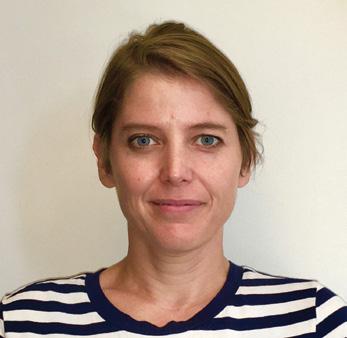
25
“I have always desired to get the best training in the field of oncology with the hope to make a major impact in the lives of my patients.”
ARASH ALIZADEH, MD, PHD STANFORD UNIVERSITY
Although many patients experience profound improvements in disease control with chimeric antigen receptor (CAR) T-cell therapies, not all people with follicular lymphoma (FL) treated with these agents will respond. Using cutting edge single-cell techniques, Dr. Alizadeh’s research aims to quantify differences between CAR T-cell responders and non-responders that can be used to identify predictors of effective treatment. “We expect our findings to shed light on how to personalize CAR T therapies for future patients with FL using bloodand tissue-based diagnostic strategies, and also to identify new and improved immunotherapeutic strategies to overcome treatment resistance to engineered cell therapy of FL,” he explains.
Dr. Alizadeh is a Professor of Medicine at Stanford University, where he leads the Cancer Genomics program at the Stanford Cancer Institute. He first became interested in FL as an MD/PhD student when his classmate and close friend lost a parent to the disease at a young age. “This huge loss was devastating and a defining moment in my career, as it helped shape my scientific interests and focus on FL,” he says. Since then, he has dedicated his career to understanding FL at the molecular, cellular, and patient levels.
Looking forward, Dr. Alizadeh is optimistic about the future of FL research. “Over the last 50 years or so, there have been decade-by-decade improvements in the outcomes of patients with FL, yet the disease remains incurable for most patients diagnosed with the disease,” he says. But he sees remarkable hope in emerging cell-based therapies and bispecific T-cell engagers and the continuous refinements that are being made to not only improve these treatments, but also to identify the right therapy for individual patients. “These tools give me special hope for the future of patients with FL, in teaching us about how to best approach curative outcomes for this disease.”
Dr. Alizadeh is also a member of LRF’s Scientific Advisory Board (SAB).
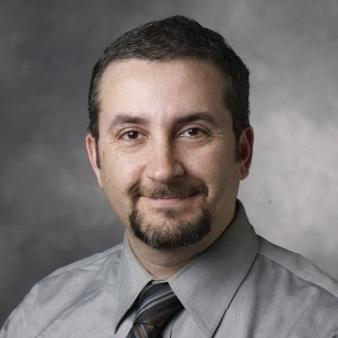 ROBERT KRIDEL, MD, MPH, PHD UNIVERSITY HEALTH NETWORK, TORONTO
ROBERT KRIDEL, MD, MPH, PHD UNIVERSITY HEALTH NETWORK, TORONTO
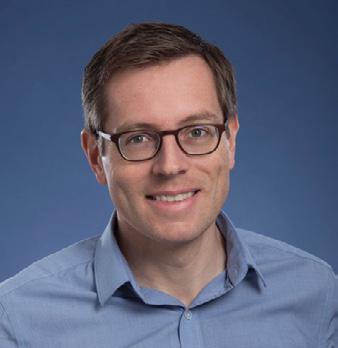
Despite therapeutic advances that have transformed the treatment of follicular lymphoma (FL), the disease remains incurable for many patients. Using genomic profiling of tumor samples from large numbers of patients, Dr. Kridel’s research aims to illuminate how FL develops and evolves in different groups of patients, with the goal of identifying unique vulnerabilities that can be targeted with new therapies.
Dr. Kridel earned his medical degree from the Catholic University of Louvain in Belgium. He earned his PhD in pathology and laboratory medicine from The University of British Columbia in Canada. He now serves as an Assistant Professor at the University of Toronto and a Staff Physician at the Princess Margaret Cancer Centre in Toronto, Canada. “The patients I have the privilege of caring for are the primary source of inspiration for my dedication to science and lymphoma research,” he says.
“The most thrilling advancement is the creation of new targeted and/or immune therapies that are effective, even when chemotherapy has failed, and could potentially replace chemotherapy entirely in the future,” Dr. Kridel says as he looks forward to the future of FL care.
“Furthermore, the rapidly advancing understanding of the pathobiological aspects of FL gives me hope that in the future, every patient’s lymphoma can be treated based on the unique characteristics present in their tumor.”
[ FROM THE FIELD ]
PULSE | SPRING EDITION 2023
“These tools give me special hope for the future of patients with FL, in teaching us about how to best approach curative outcomes for this disease.”
LYMPHOMA TOOLS AND RESOURCES AT YOUR FINGERTIPS


Focus on Lymphoma is the first app to provide patients and their caregivers with tailored content based on lymphoma subtype, and actionable tools to better manage diagnosis and treatment.
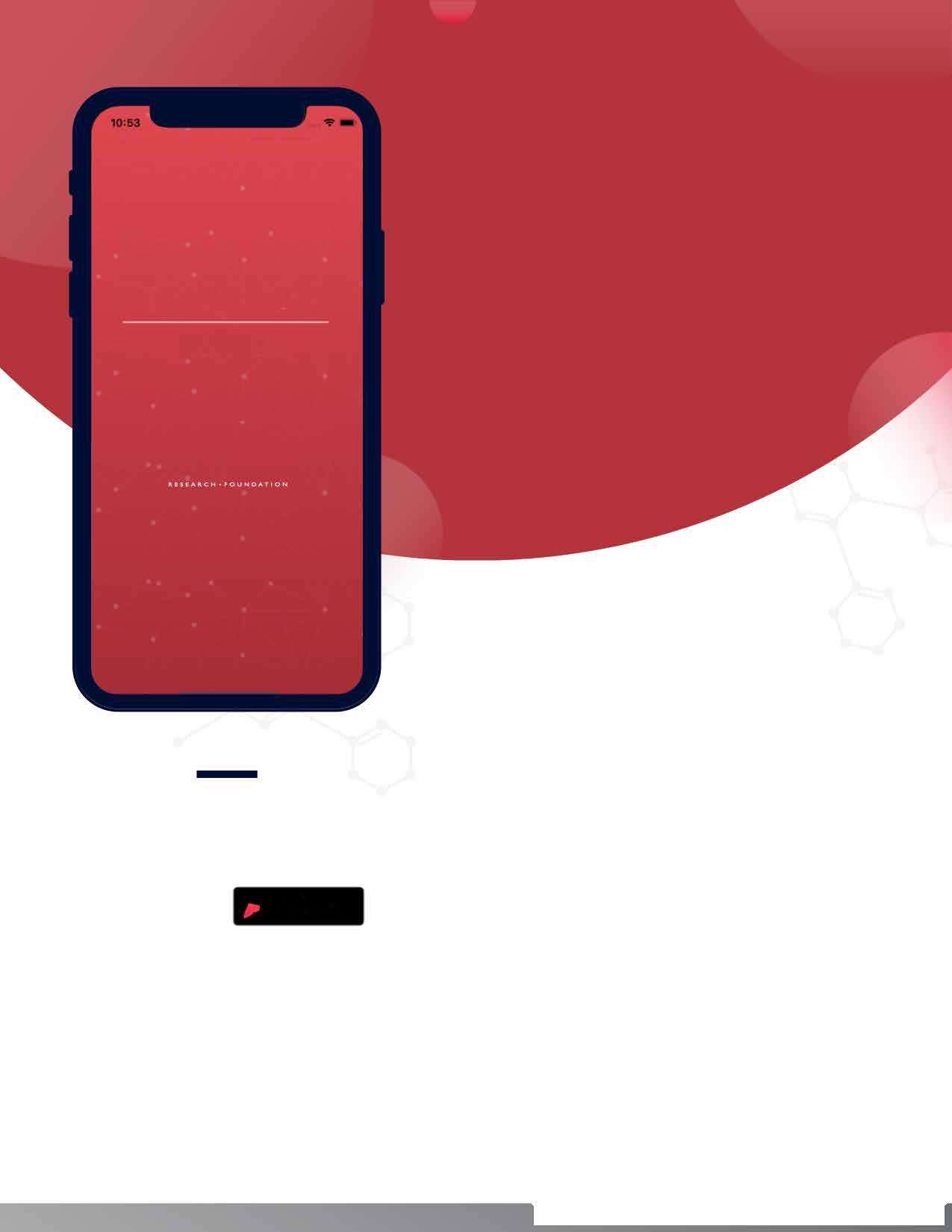

LEARN
QExplore educational content tailored to your subtype and disease stage, and learn at your own pace.
TRACK
rA full suite of customized tools helps you track, manage, and organize your lymphoma-related information, all in one convenient place.
CONNECT
Connect with an entire community, including lymphoma patients, survivors, and LRF Helpline staff, for individualized support.
• • -· • • • • .. F<O)CUS ON LY M PHOM A Brought to you by LYMPH(Q)MA AVAILABLE FOR FREE DOWNLOAD ...... GETITON ,.,... Google Play lymphoma.org/focusonlymphoma LYMPHOMA RESEARCH •FOUNDATION
STORY OF HOPE: SCOTT FINK
Scott Fink is a born-and-bred New Yorker, married 20 years to his wife, Kelly, and father to 14-year-old twin daughters. He’s called New York City home for most of his life, aside from his undergraduate years at the University of Wisconsin-Madison and the early months of the pandemic when he moved his family to Long Island to shelter in place. Having worked at the American Stock Exchange on Sept. 11, 2001, he is no stranger to life’s challenges, but one of his biggest was being diagnosed with lymphoma in the midst of a raging global pandemic.

[ LIVING WITH LYMPHOMA ]
| SPRING EDITION 2023
PULSE
An avid runner, Fink has completed numerous halfmarathons. Following one of his training runs in October of 2020, he felt a debilitating pain in his back like nothing he’d experienced before. Unbeknownst to him, this was Fink’s first symptom, which ended up leading him to a lymphoma diagnosis.
“I would occasionally experience lower back soreness after a run, but this time I was having profound back spasms that were making me unable to walk,” recalls Fink. “It was New York, mid-pandemic, so I tried to manage the pain with Aleve to avoid going to the hospital. But eventually, we reluctantly called an ambulance to take me to the hospital.”
At the hospital, the ER doctors ordered an MRI, telling Fink it could be anything from meningitis to cancer. After failing to find anything conclusive and confirming that he was able to walk again, they sent him home with antiinflammatory medication.

Trusting His Body
While recovering, he decided to consult with his close friend (and brother of his brother-in-law), who is a neuroradiologist, about his condition. Fink shared the MRI images with him and continued to focus on recovering from his back pain, getting back to walking, albeit gingerly, around his apartment. A few days later, he received a call back with a recommendation that he follow up with his internist for more testing.
Follicular lymphoma is typically a slow-growing or indolent form of non-Hodgkin lymphoma that arises from B-lymphocytes, making it a B-cell lymphoma. This lymphoma subtype accounts for 20%-30% of all NHL cases. Follicular lymphoma is usually not considered to be curable, instead categorized as more of a chronic disease. Patients can live for many years with this form of lymphoma.
Fink considered himself healthy, an active runner with no symptoms that would have made him suspect a lymphoma diagnosis. It turned out that the occasional back pain that he had experienced after running wasn’t just typical soreness from exercise, but instead was a mass that was getting dangerously close to penetrating his spine’s bone marrow.
“As far as I’m concerned, my brother-in-law’s brother saved my life. I was sent home from the hospital in the middle of a global pandemic with back spasms that they’d supposedly cured me of, and I would have just gone on with life, and the masses would have kept growing,” says Fink. “But he saw something, and he pushed me to take the steps I did. I tell him he’s my angel and I mean it.”
The next day, Fink contacted his internist and shared the MRI images with her. Amid COVID, the internist wasn’t seeing patients regularly but asked Fink to come in to her office immediately. During his visit, the internist noticed some puffiness in Fink’s pelvic area and ordered a biopsy as well as CT and PET scans. Results revealed a mass close to Fink’s spine, a pelvic mass, and a mass in the pleural lining of his lungs. He was ultimately diagnosed with a subtype of non-Hodgkin lymphoma (NHL) called follicular lymphoma (FL).
“He said, ‘Look, I’m obviously not sure and this isn’t a diagnosis, but this looks like it could be lymphoma’,” said Fink. “He’s a really heartfelt guy and was being as supportive as possible, saying that this was just his suspicion.”
Continued on the next page 29
Navigating Treatment Amidst a Global Pandemic

Upon receiving his diagnosis, Fink’s mind went immediately to the worst-case scenario. Knowing nothing about the disease, he was uncertain what his future would hold or how he could overcome this obstacle.
“It was so unnerving for me. I was genuinely shocked, just blown away. I was afraid and initially had trouble wrapping my mind around what it was ultimately going to be,” said Fink.
Fink consulted with his oncologist on the next steps, not knowing what a course of treatment might look like. Approximately two months after his initial visit to the ER, Fink started the first of six rounds of treatment –chemotherapy and immunotherapy – every 21 days.
Providing Hope to Others
As of March 2021, Fink completed his treatment and is in remission. As he reflects on his lymphoma journey to date, he continues to be grateful for all the support and encouragement he received from his community –including the Lymphoma Research Foundation (LRF).
“One thing I learned early on in my treatment is that you shouldn’t internalize your feelings. Talking to people who have had similar journeys and letting yourself talk about it allows it to be a more livable situation for us all,” says Fink. “That’s the beauty of organizations such as LRF. Aside from the wonderful research they fund, LRF creates a community that ensures nobody feels alone.”
Fink recalls being approached by the husband of a fellow lymphoma patient when he was leaving one of his treatments. The husband was likely close to 80 years old and told Fink that his wife had been a patient of Fink’s oncologist for nearly 30 years. Someday, Fink hopes he can look back on 30 years post-treatment with the same positivity of survivors he has met along the way.
“I can only hope that anything I say or do gives someone else that same positive energy at a time when they need it most.”
Fink also felt incredibly thankful for his supportive network of family and friends. From his sister-in-law, who immediately stepped up to be his advocate during medical appointments, to his wife and teenage daughters, who engaged in important dialogue as a family throughout his treatment.
“My wife and I sat our daughters down and explained that it was going to be a rough few months, but that things were eventually going to be fine – this was just a bump in the road,” recalls Fink. “There was nothing I could do to shield them from reality, but we’re a really tight family and have great communication. We tried to just navigate everything as it came.”
Fink feels fortunate that his treatment was relatively routine, and in the new working world of virtual meetings, he could simply turn his camera off and continue to work.
“Consider everything we all went through during the pandemic. It’s mind-blowing to think that a global pandemic would be the secondary crisis in my family’s life during the last couple of years,” says Fink.
[ LIVING WITH LYMPHOMA ]
“I lived down the street from the hospital where I was being treated, so it was easy to get to, but I also was grateful that this hospital is dedicated to cancer and cuttingedge research,” said Fink. “My oncologist was also there, and I felt so fortunate to be in his care.”
PULSE | SPRING EDITION 2023
YOU’RE INVITED TO OUR 2023 ANNUAL GALA
SEPTEMBER 28, 2023 | 6:30 PM ET ZIEGFELD BALLROOM, NEW YORK CITY
You’re invited to a special event celebrating all we’ve accomplished together to eradicate lymphoma! Join us to raise funds, celebrate our distinguished honorees, and be inspired by the significant achievements and advancements made in lymphoma research over the past year.

MAKE AND IMPACT. JOIN AS AN EVENT SPONSOR.
A variety of exciting packages and sponsorship benefits are available for the 2023 LRF Annual Gala. For more information about this year’s Gala, contact Rebecca Raush, Director of Event Fundraising, at 917 882 9036 or rrausch@lymphoma.org.
lymphoma.org/gala
SCIENTIFIC ADVISORY BOARD
The Lymphoma Research Foundation’s volunteer Scientific Advisory Board, comprised of 45 world-renowned lymphoma experts, guides the Foundation’s research activities, seeking out the most innovative and promising lymphoma research projects for support.
2022-2023 MEMBERSHIP
SONALI M. SMITH, MD, FASCO Chair
The University of Chicago
ANN S. LACASCE, MD, MMSc Chair-Elect Harvard Medical School Dana-Farber Cancer Institute
RANJANA ADVANI, MD Stanford University School of Medicine
ASH A. ALIZADEH, MD, PhD Stanford University School of Medicine
STEPHEN ANSELL, MD, PhD Mayo Clinic, Rochester
KRISTIE A. BLUM, MD Winship Cancer Institute of Emory University
JENNIFER BROWN, MD
Dana-Farber Cancer Institute
JAMES CERHAN, MD, PhD Mayo Clinic, Rochester
ETHEL CESARMAN, MD, PhD NewYork-Presbyterian Hospital
Weill Cornell Medicine
BRUCE D. CHESON, MD, FACP, FAAAS, FASCO Past Chair, 2010-2012 The Center for Cancer and Blood Disorders
SANDEEP DAVE, MD, MS Duke University
KIERON M. DUNLEAVY, MD Georgetown Lombardi Comprehensive Cancer Center
KOJO S.J. ELENITOBA-JOHNSON, MD Memorial Sloan Kettering Cancer Center
ANDREW M. EVENS, DO, MSc, FACP Rutgers Cancer Institute of New Jersey
CHRISTOPHER R. FLOWERS, MD, MS The University of Texas MD Anderson Cancer Center
JONATHAN W. FRIEDBERG, MD, MMSc University of Rochester James P. Wilmot Cancer Institute
LEO I. GORDON, MD, FACP Past Chair, 2015-2017
Robert H. Lurie Comprehensive Cancer Center of Northwestern University
MICHAEL GREEN, PhD The University of Texas MD Anderson Cancer Center
THOMAS M. HABERMANN, MD Past Chair, 2017-2019 Mayo Clinic, Rochester
STEVEN M. HORWITZ, MD Memorial Sloan Kettering Cancer Center
ERIC D. HSI, MD Wake Forest
BRAD S. KAHL, MD Washington University School of Medicine
KARA KELLY, MD Roswell Park Comprehensive Cancer Center University at Buffalo Jacobs School of Medicine and Biomedical Sciences
JOHN P. LEONARD, MD Past Chair, 2012-2015 NewYork-Presbyterian Hospital Weill Cornell Medicine
BRIAN K. LINK, MD University of Iowa
IZIDORE S. LOSSOS, MD University of Miami Health System Sylvester Comprehensive Cancer Center
PETER MARTIN, MD Weill Cornell Medicine
ARI MELNICK, MD NewYork-Presbyterian Hospital Weill Cornell Medicine
LINDSAY MORTON, PhD National Cancer Institute
LORETTA NASTOUPIL, MD The University of Texas MD Anderson Cancer Center
TERESA PALOMERO, PhD Institute for Cancer Genetics, Columbia University
LAURA PASQUALUCCI, MD Institute for Cancer Genetics, Columbia University
BARBARA PRO, MD Columbia University
H. Irving Comprehensive Cancer Center
LISA RIMSZA, MD Mayo Clinic, Arizona
LISA GIULINO ROTH, MD Weill Cornell Medicine
KERRY J. SAVAGE, MD BC Cancer, Vancouver
DAVID W. SCOTT, MBChB, PhD BC Cancer, Vancouver
LAURIE SEHN, MD, MPH BC Cancer, Vancouver
MARGARET SHIPP, MD Harvard Medical School Dana-Farber Cancer Institute
EDUARDO M. SOTOMAYOR, MD Tampa General Hospital
CHRISTIAN STEIDL, MD BC Cancer, Vancouver
JOHN M. TIMMERMAN, MD UCLA Jonsson Comprehensive Cancer Center
SVEN de VOS, MD, PhD UCLA Jonsson Comprehensive Cancer Center
HANS-GUIDO WENDEL, MD
Memorial Sloan Kettering Cancer Center
ANDREW D. ZELENETZ, MD, PhD
Immediate Past Chair, 2019-2021 Memorial Sloan Kettering Cancer Center
MEMBERS EMERITUS
MORTON COLEMAN, MD
NewYork-Presbyterian Hospital Weill Cornell Medicine
KANTI R. RAI, MD
Donald and Barbara Zucker School of Medicine at Hofstra/Northwell
MICHAEL E. WILLIAMS, MD, ScM
University of Virginia Cancer Center
PULSE | SPRING EDITION 2023

New York Lymphoma Walk ......................................................... 6.10 Chicago Lymphoma Workshop ...................................................... 6.17 Chicago Lymphoma Walk........................................................... 7.30 Blood Cancer Awareness Month ..................................................... 9.1–30 2023 Annual Gala ................................................................ 9.28 UPCOMING EVENTS Want to receive information about Lymphoma Research Foundation events happening in your area? Visit lymphoma.org/emailsignup to select your email preferences, and stay up to date with the latest from the Foundation. 33

Wall Street Plaza 88 Pine Street, Suite 2400 New York, NY 10005 NONPROFIT ORGANIZATION U.S. POSTAGE PAID NEW YORK, NY PERMIT NO. XXX


 Executive Officer
Executive Officer







 Meghan Gutierrez Chief Executive Officer
Meghan Gutierrez Chief Executive Officer



















































































 ROBERT KRIDEL, MD, MPH, PHD UNIVERSITY HEALTH NETWORK, TORONTO
ROBERT KRIDEL, MD, MPH, PHD UNIVERSITY HEALTH NETWORK, TORONTO










